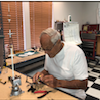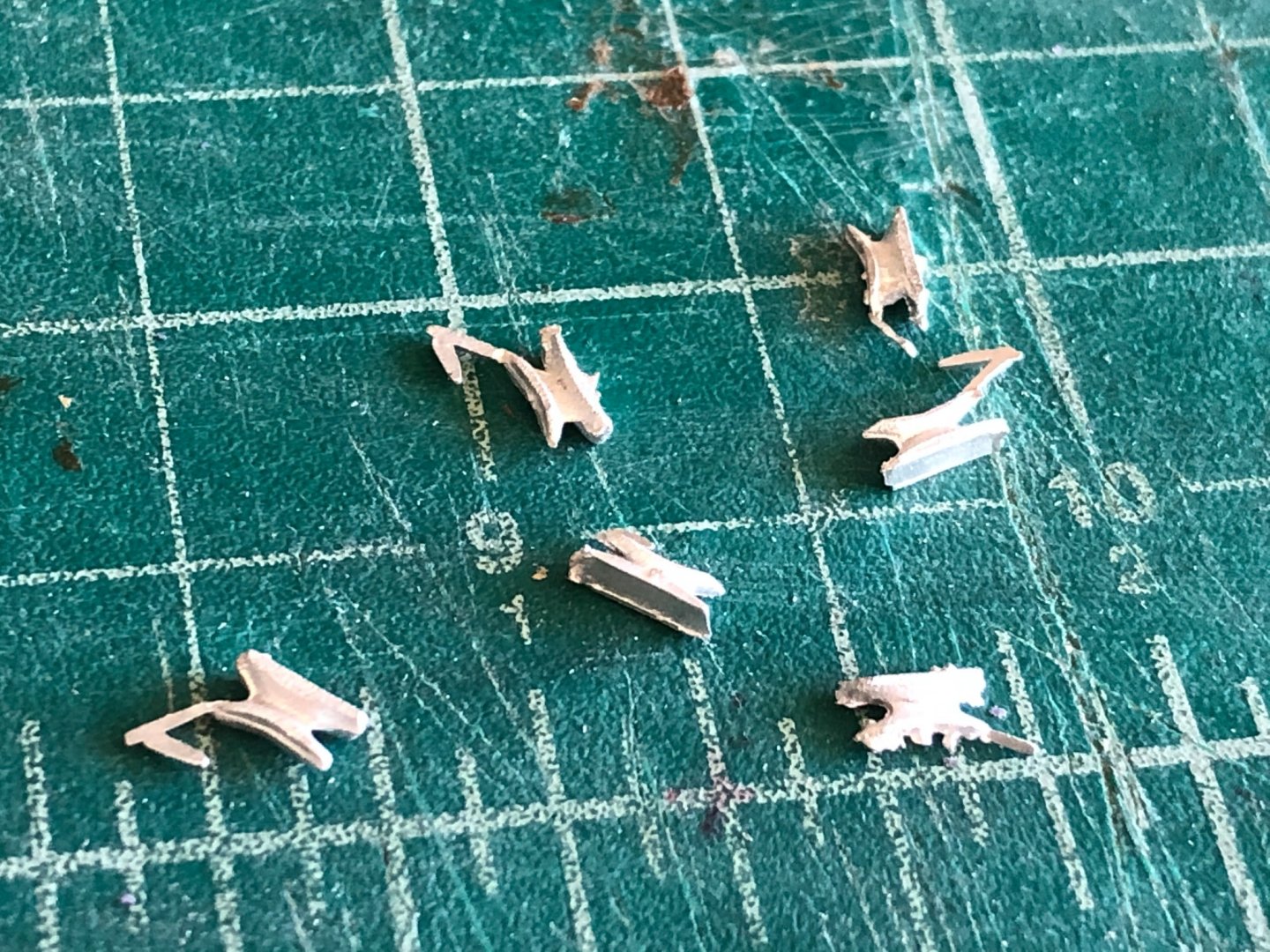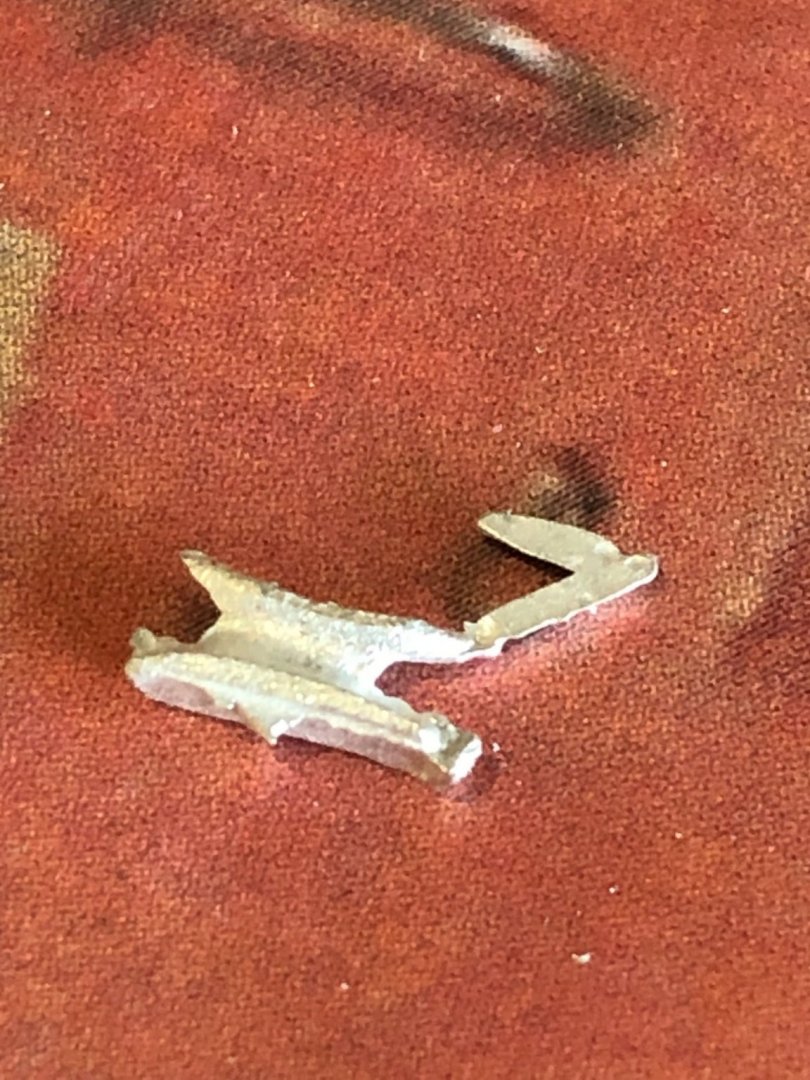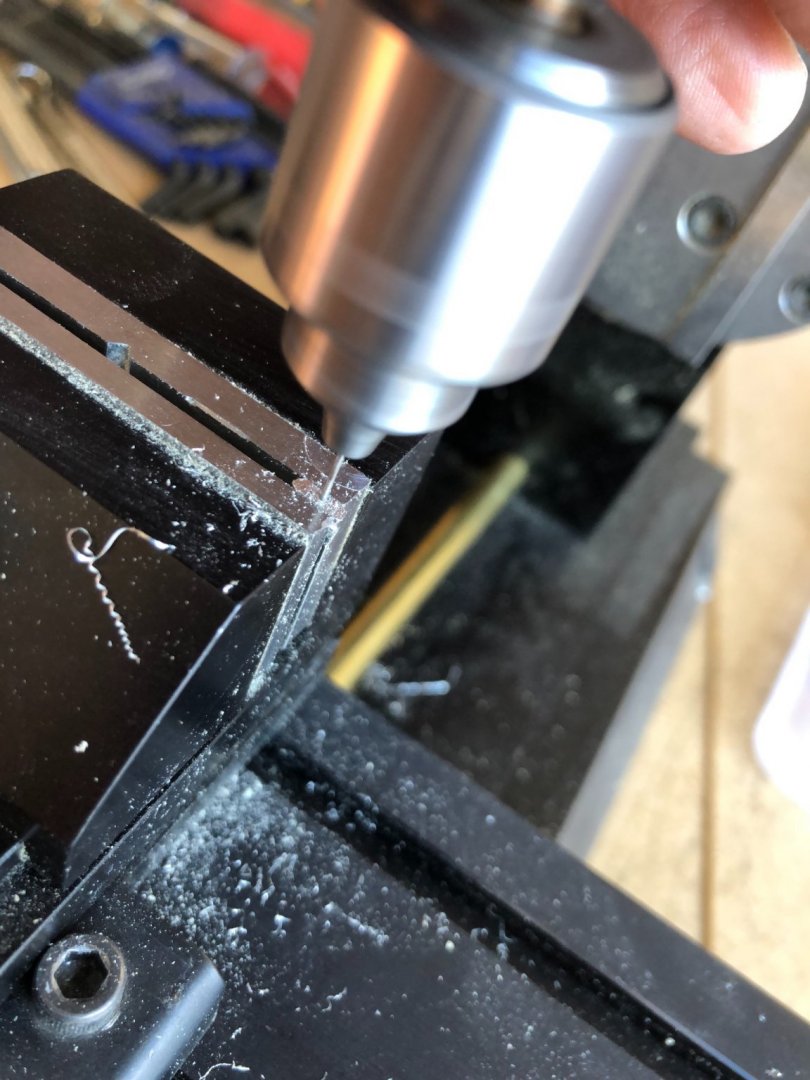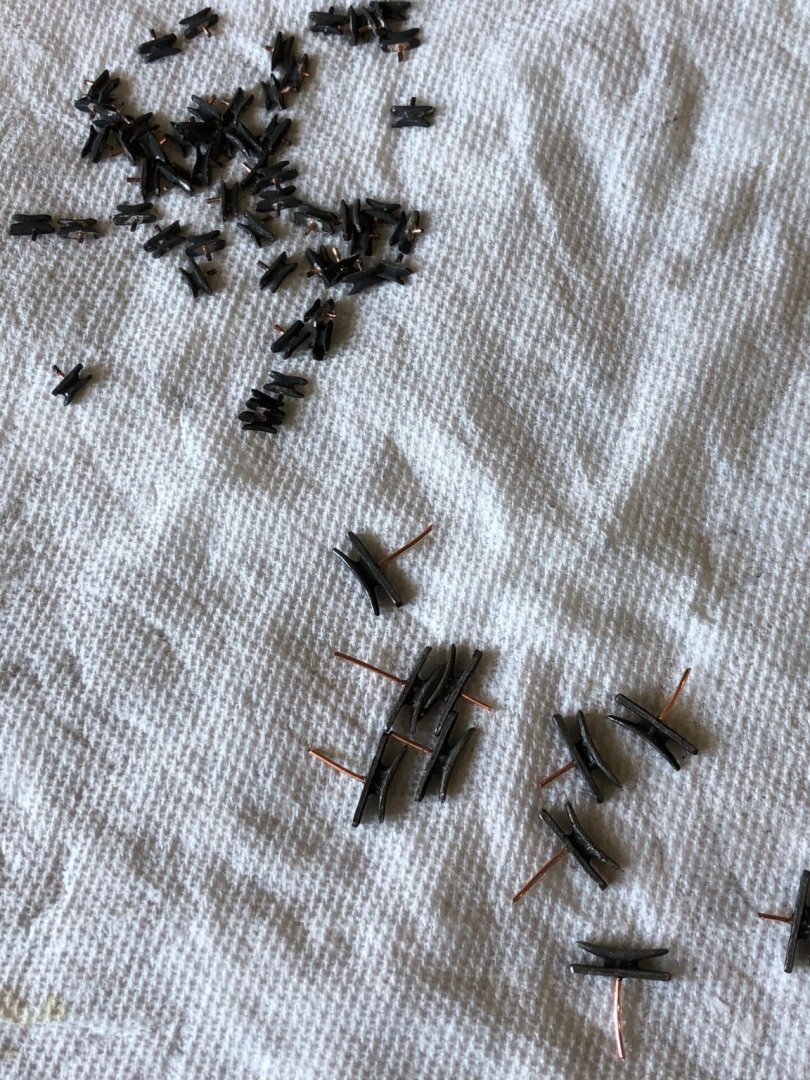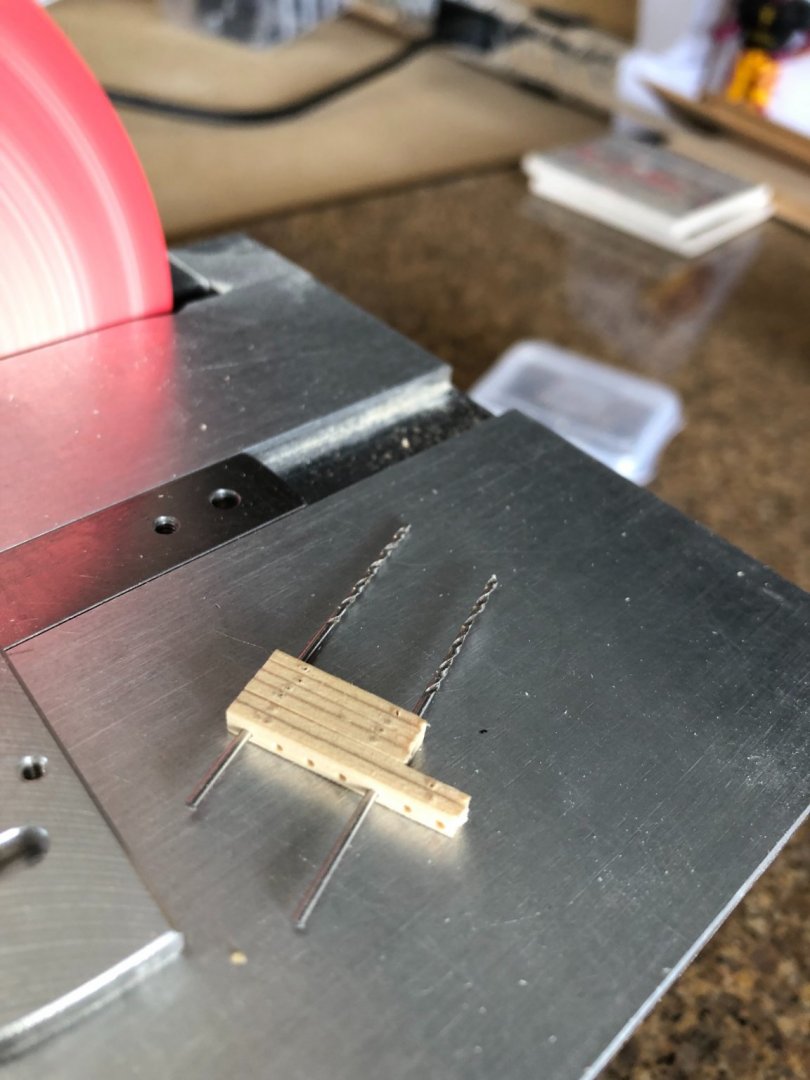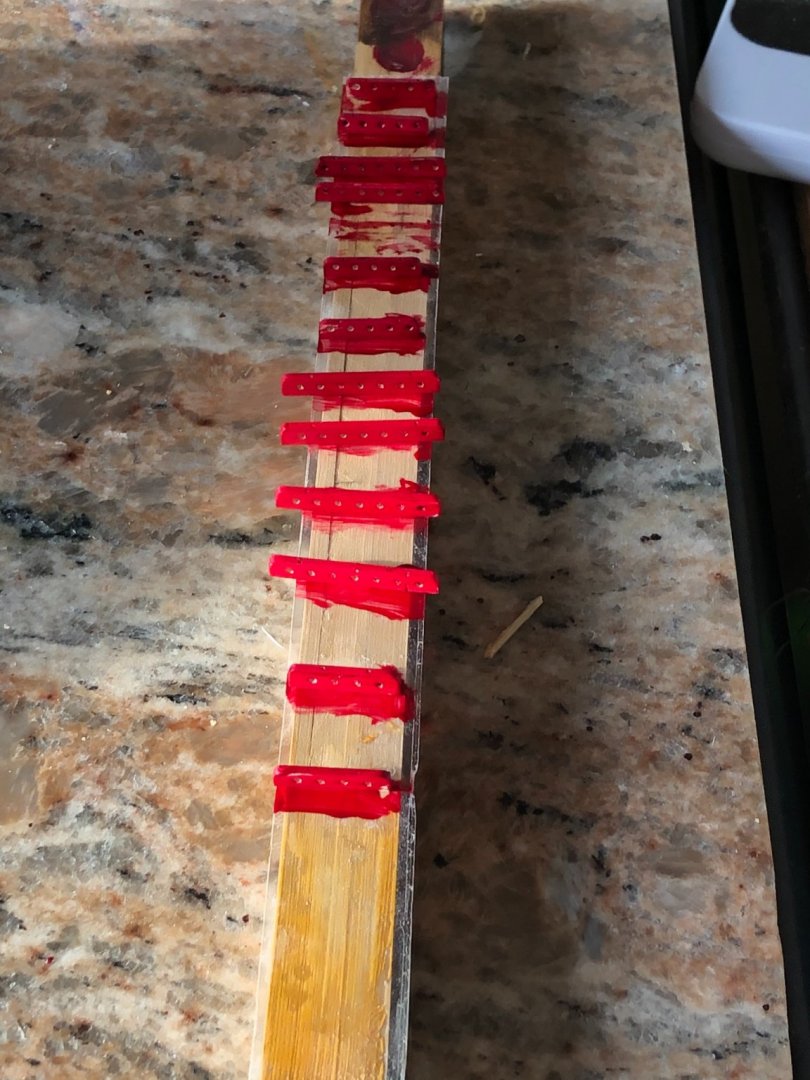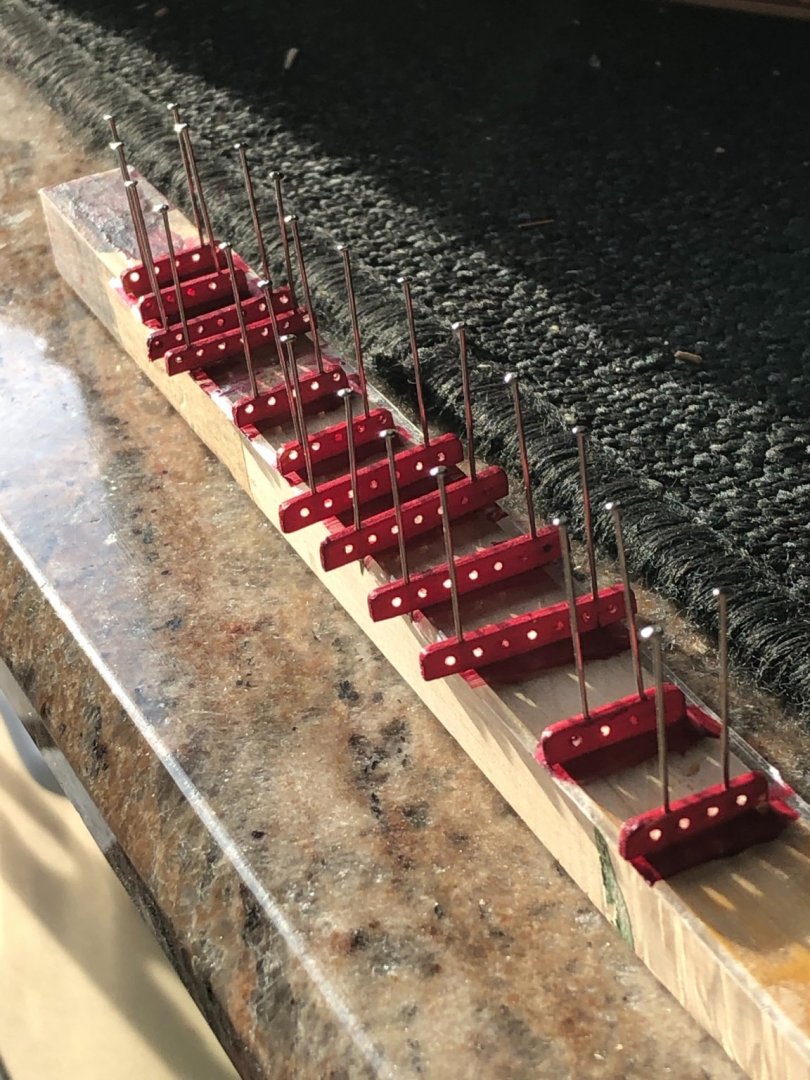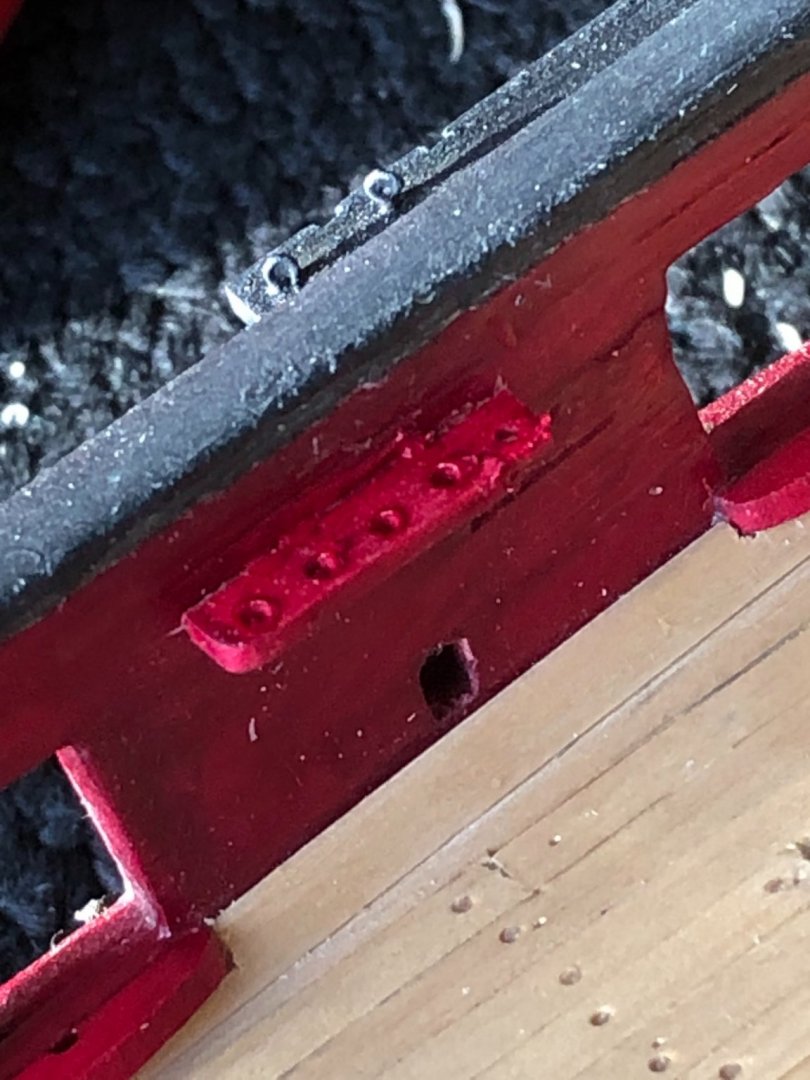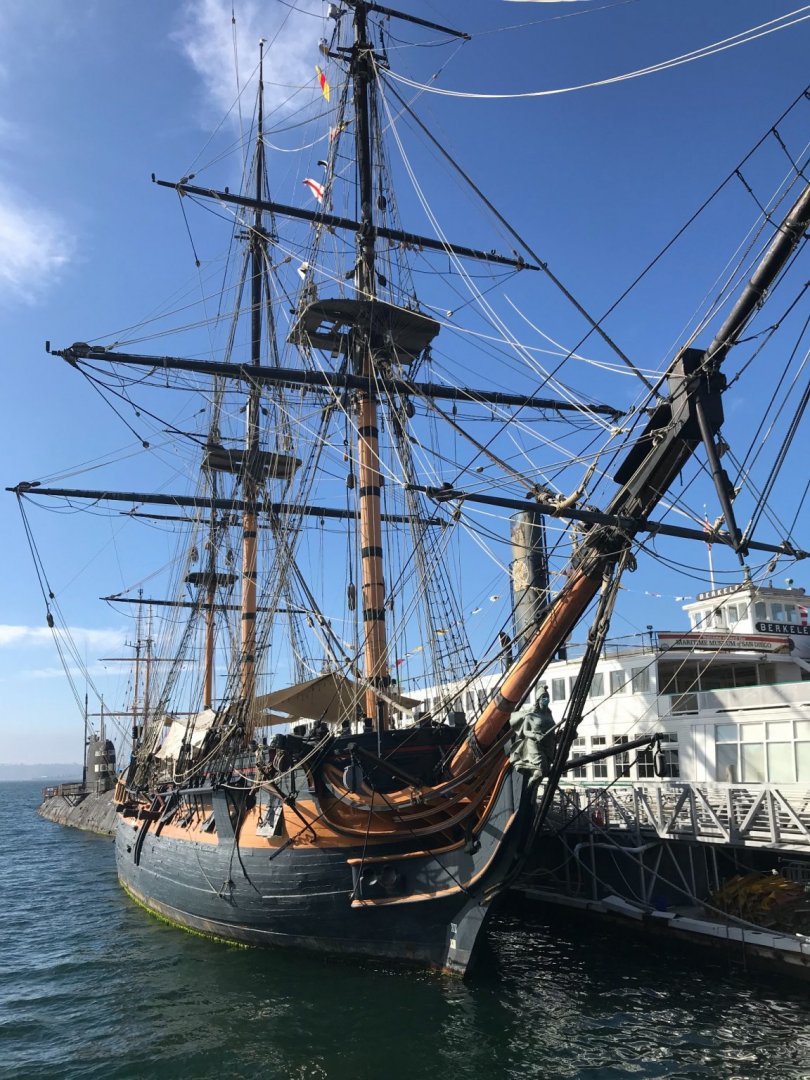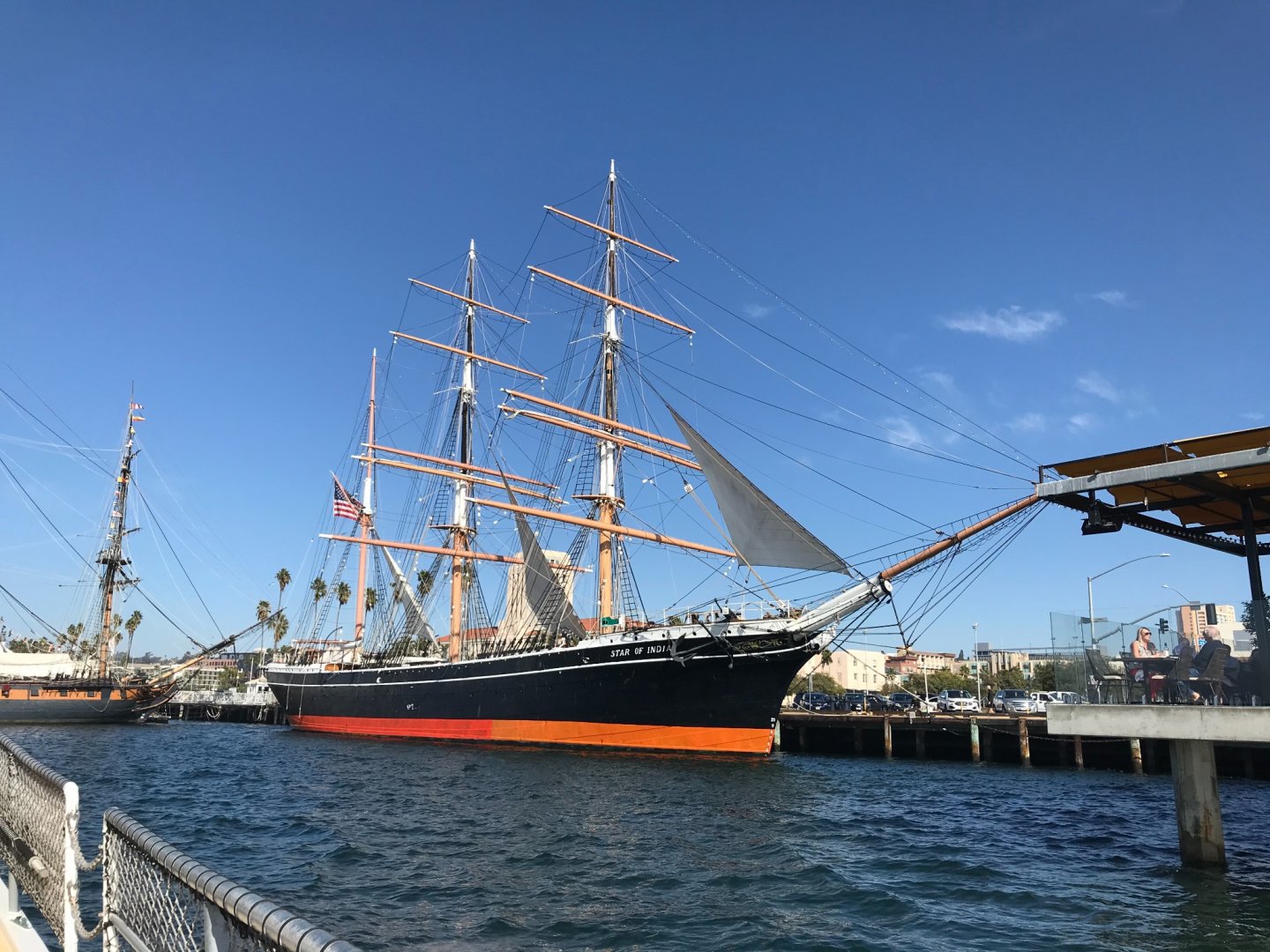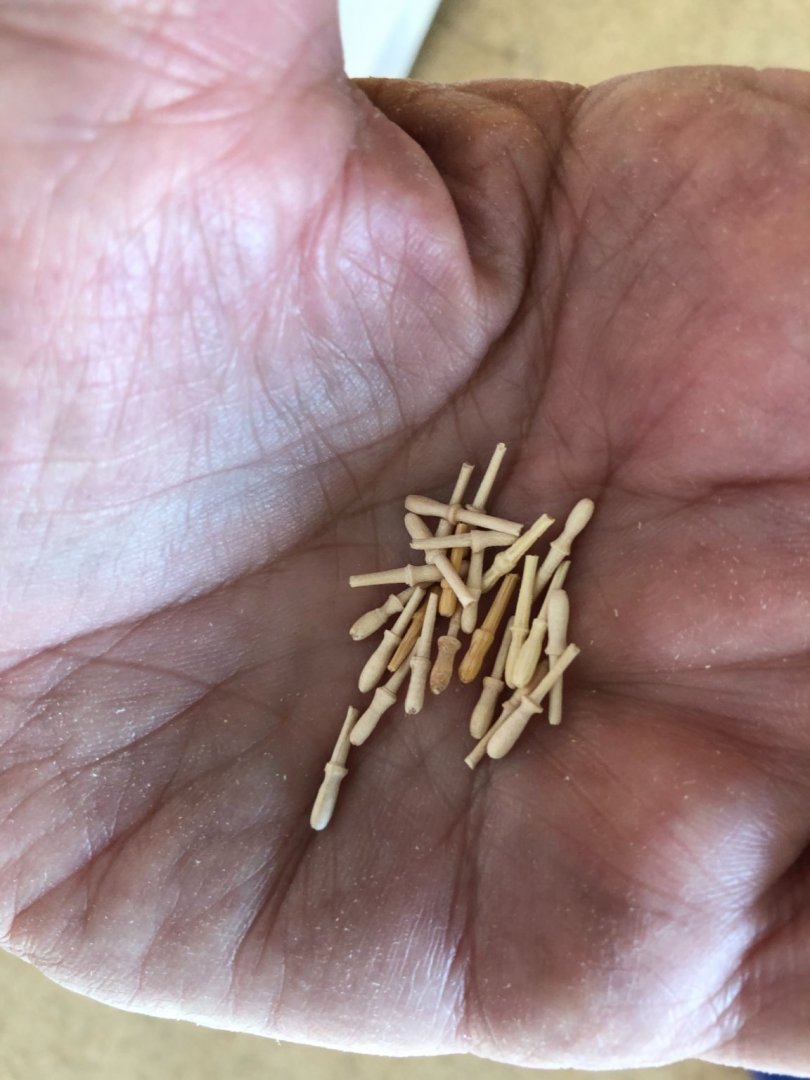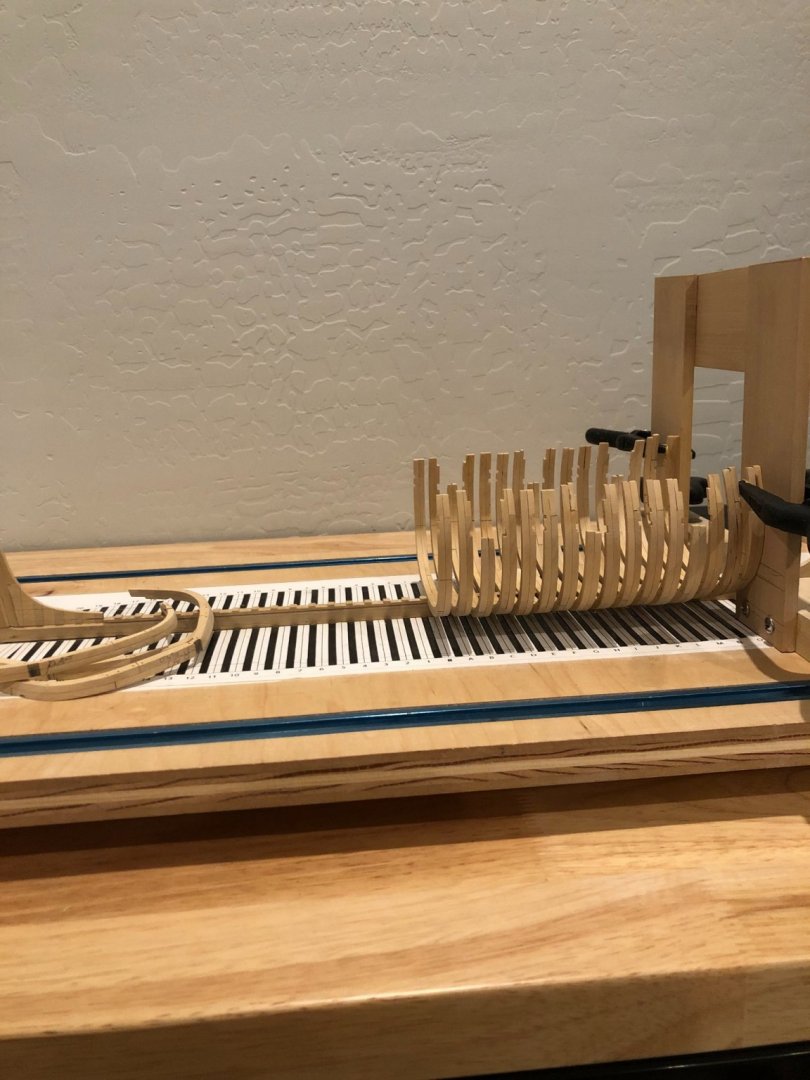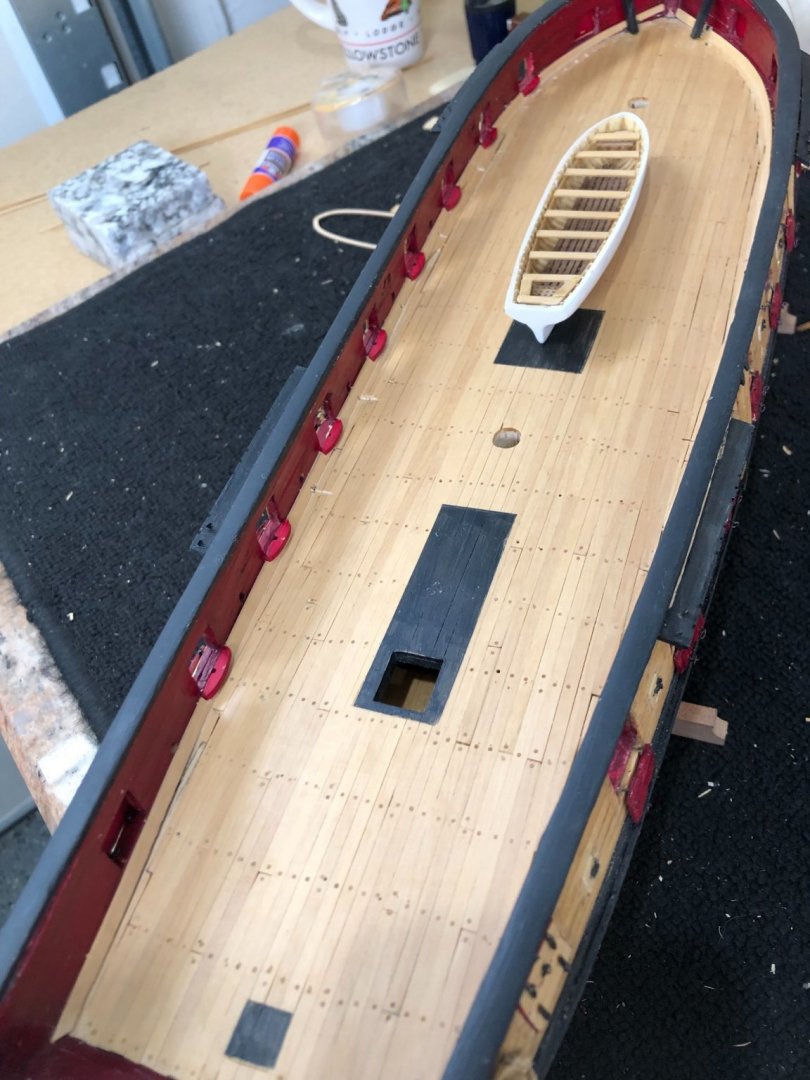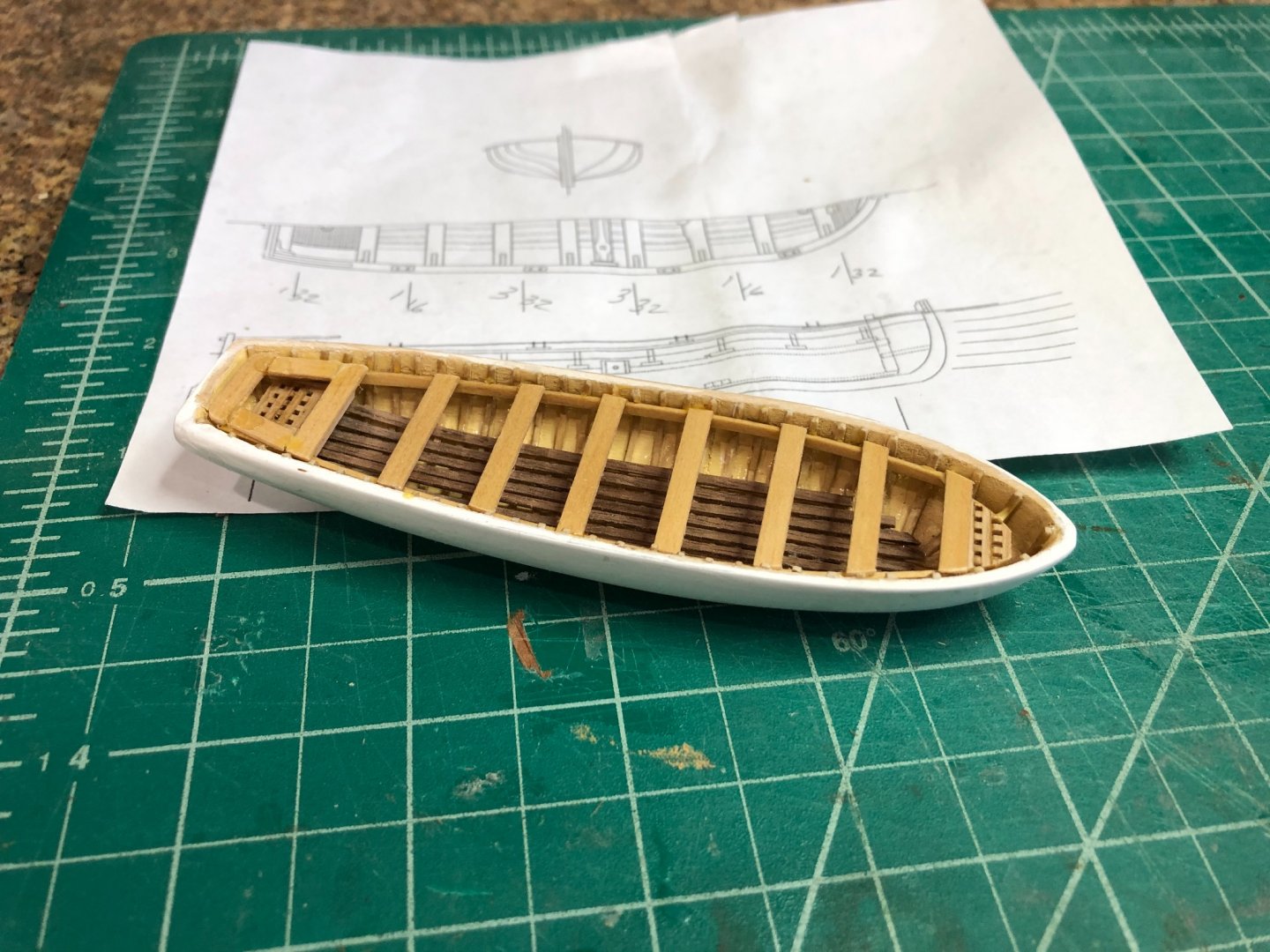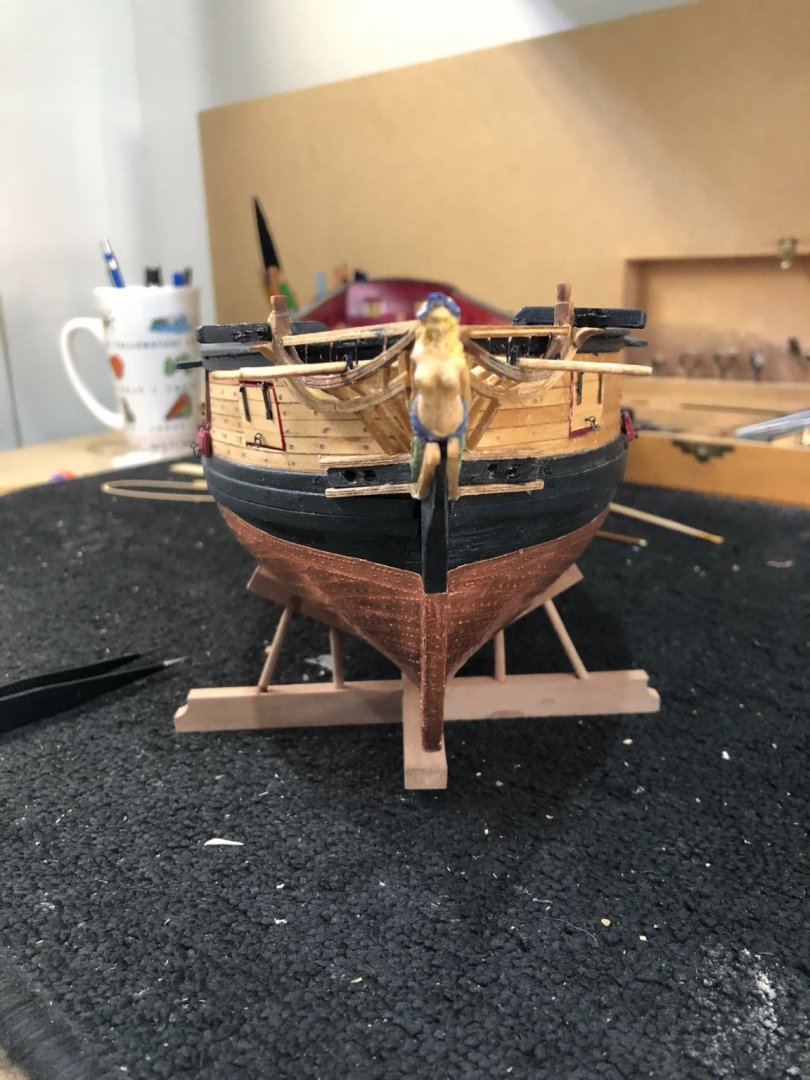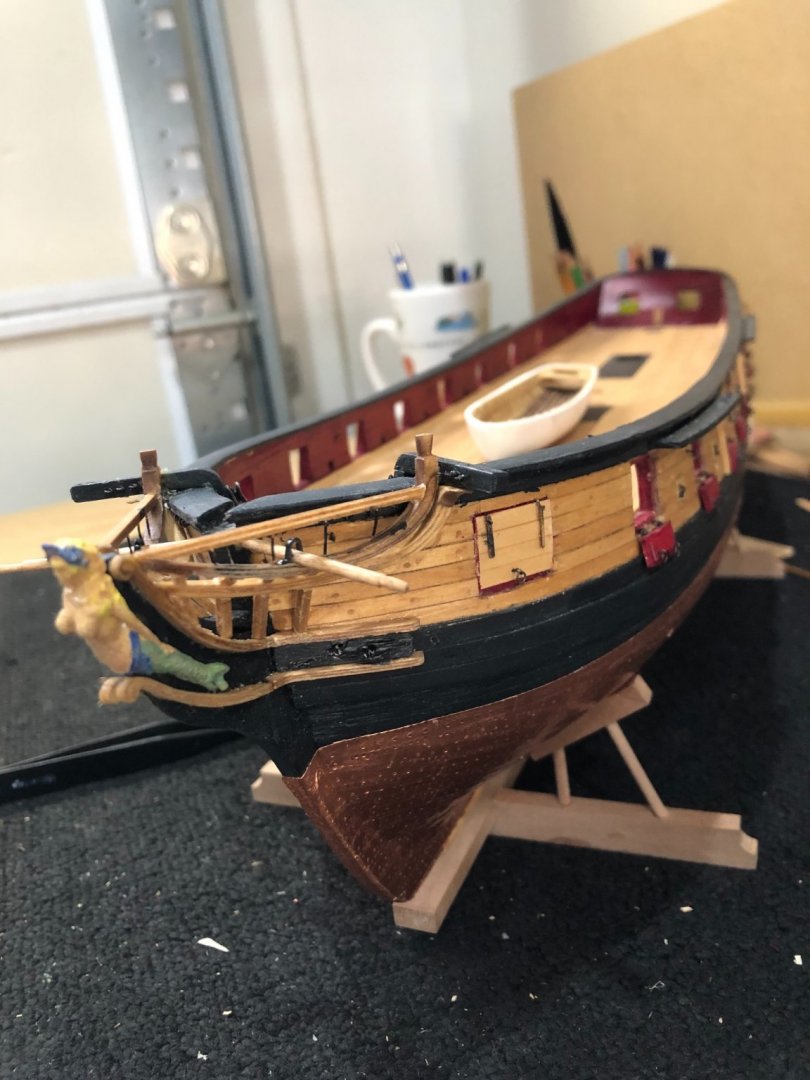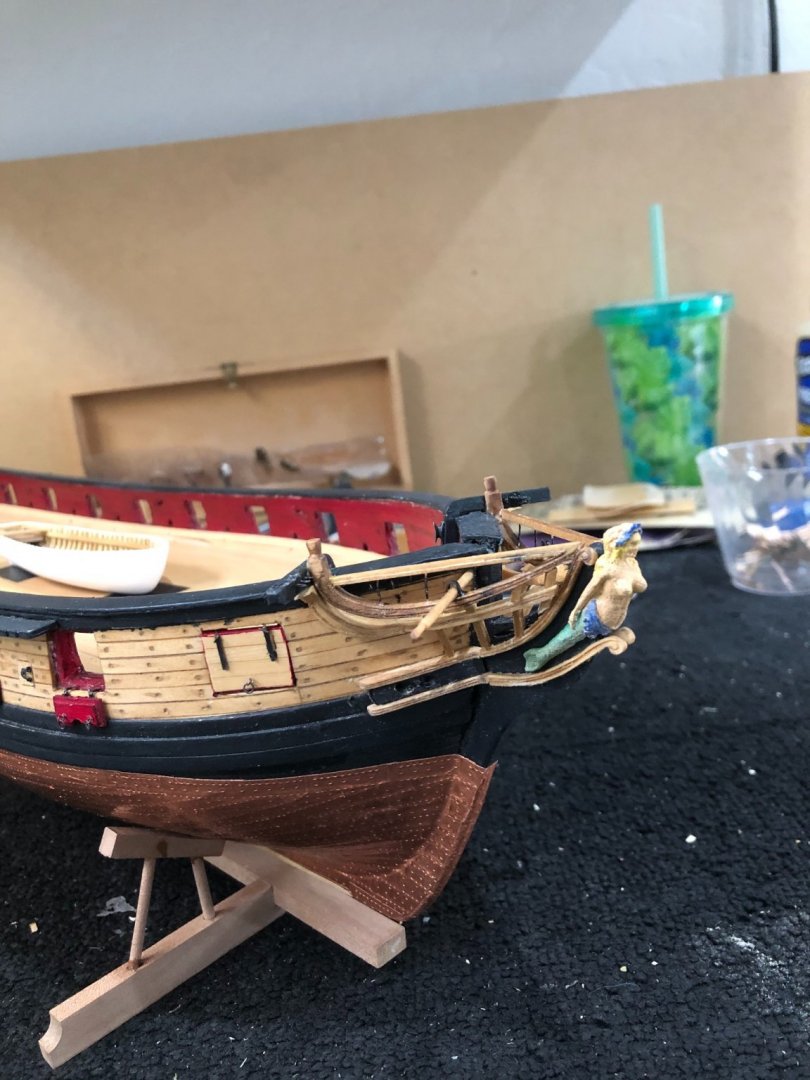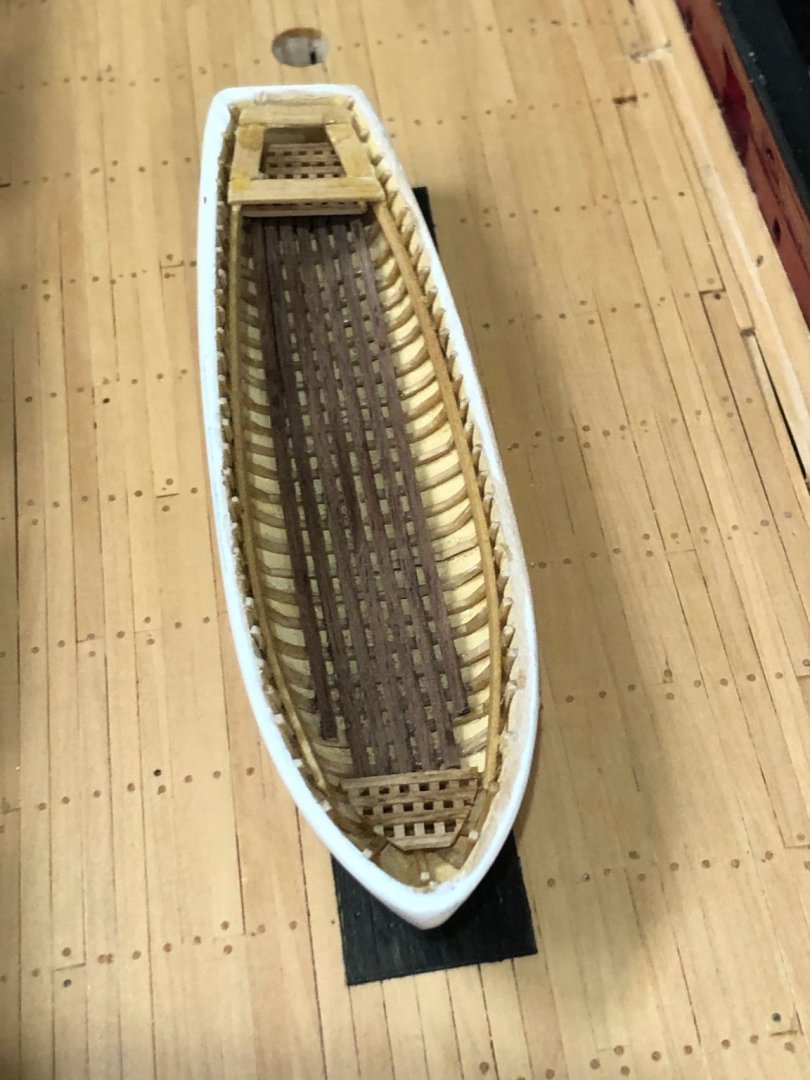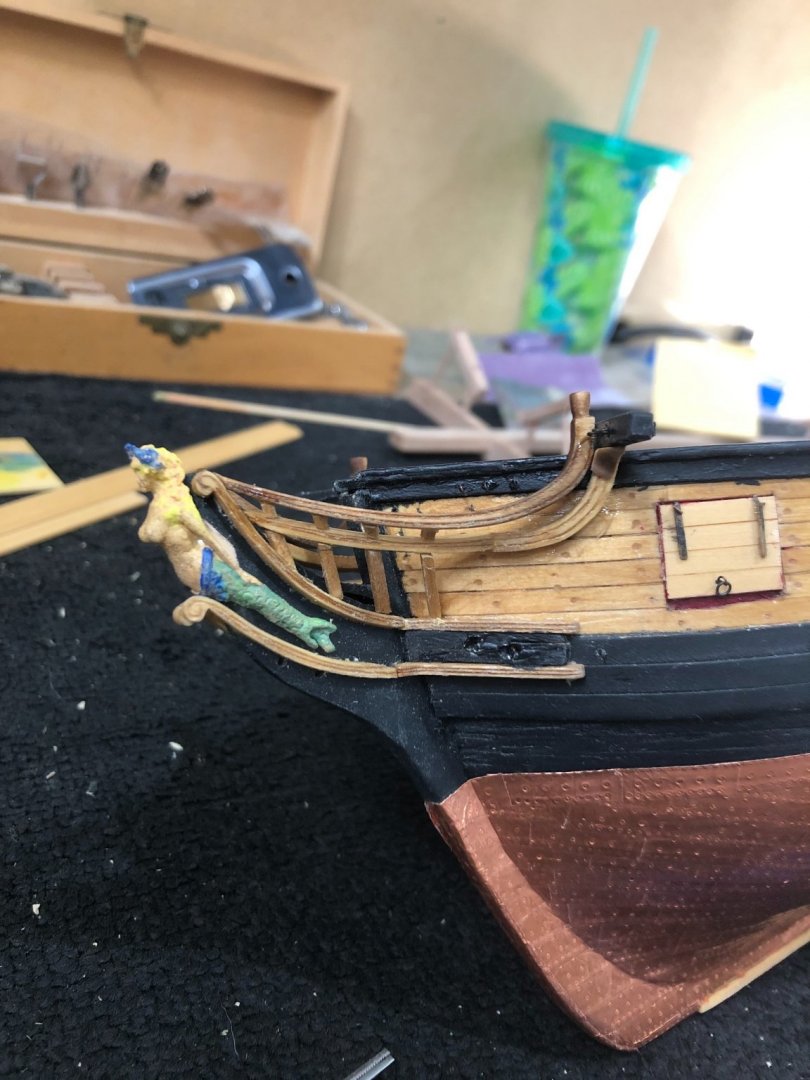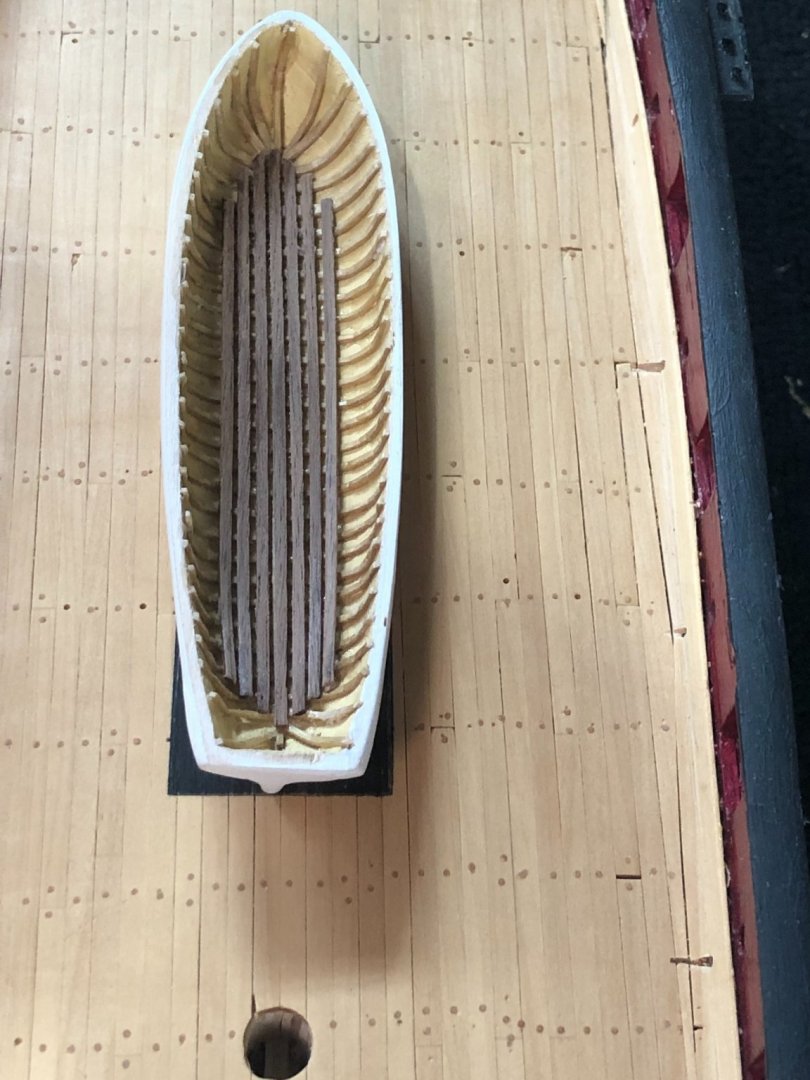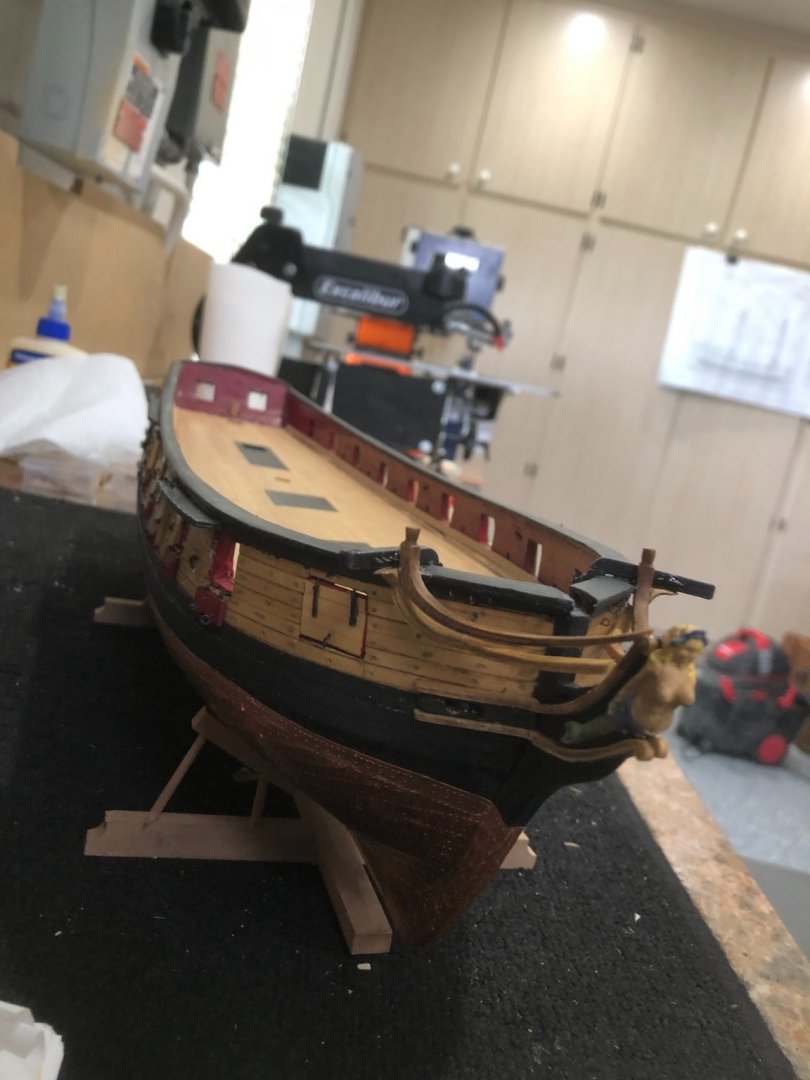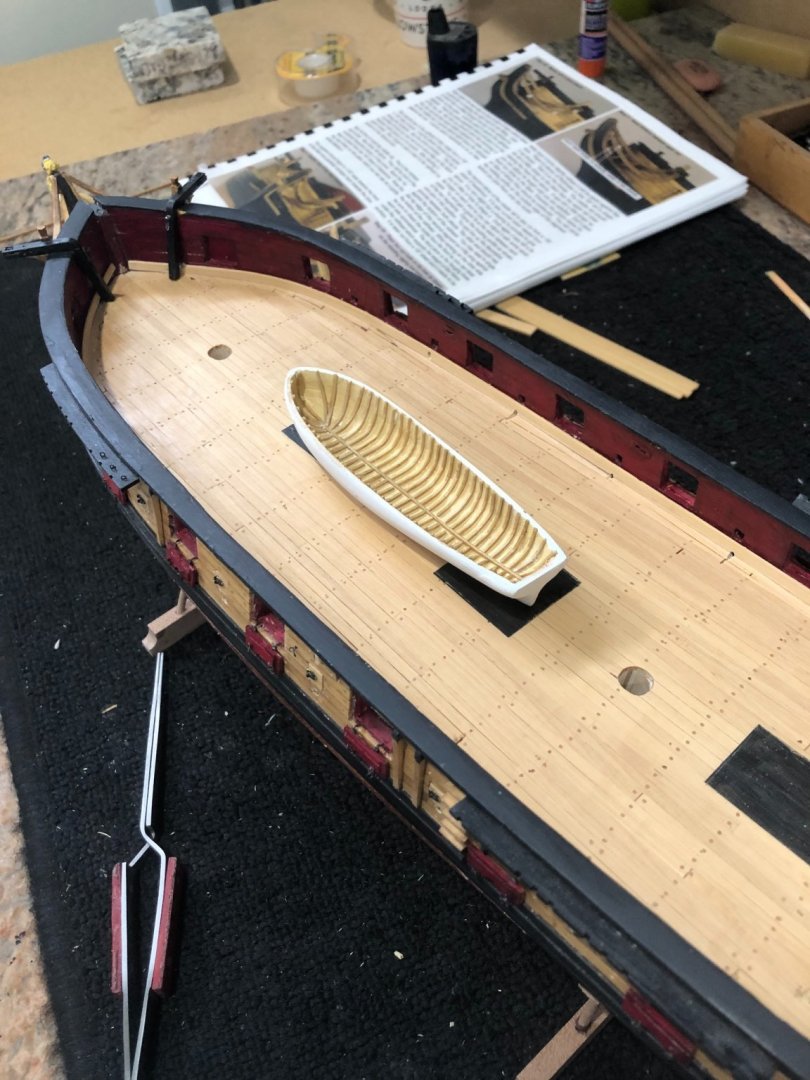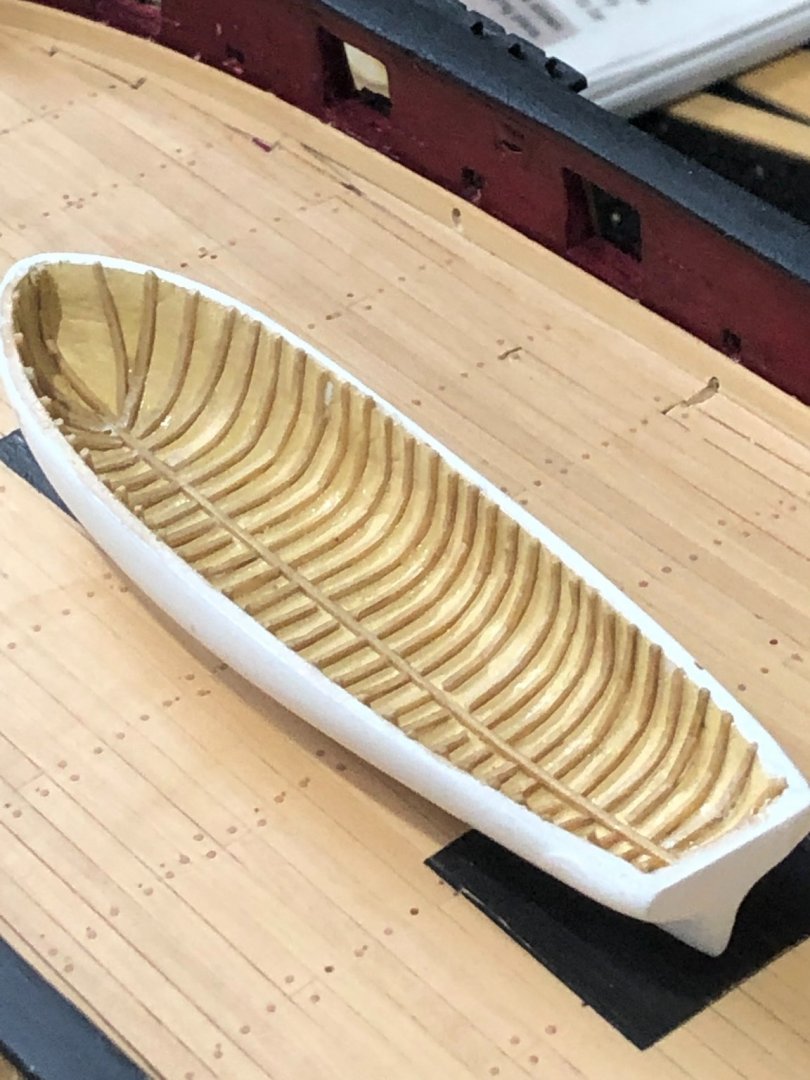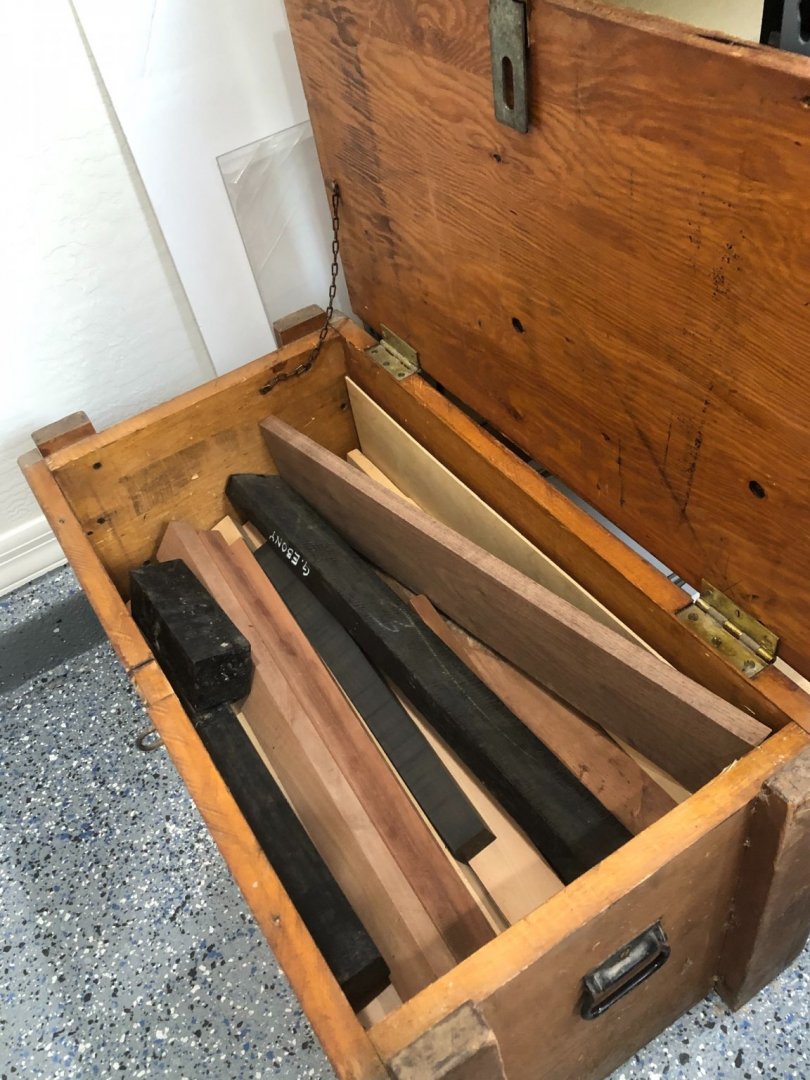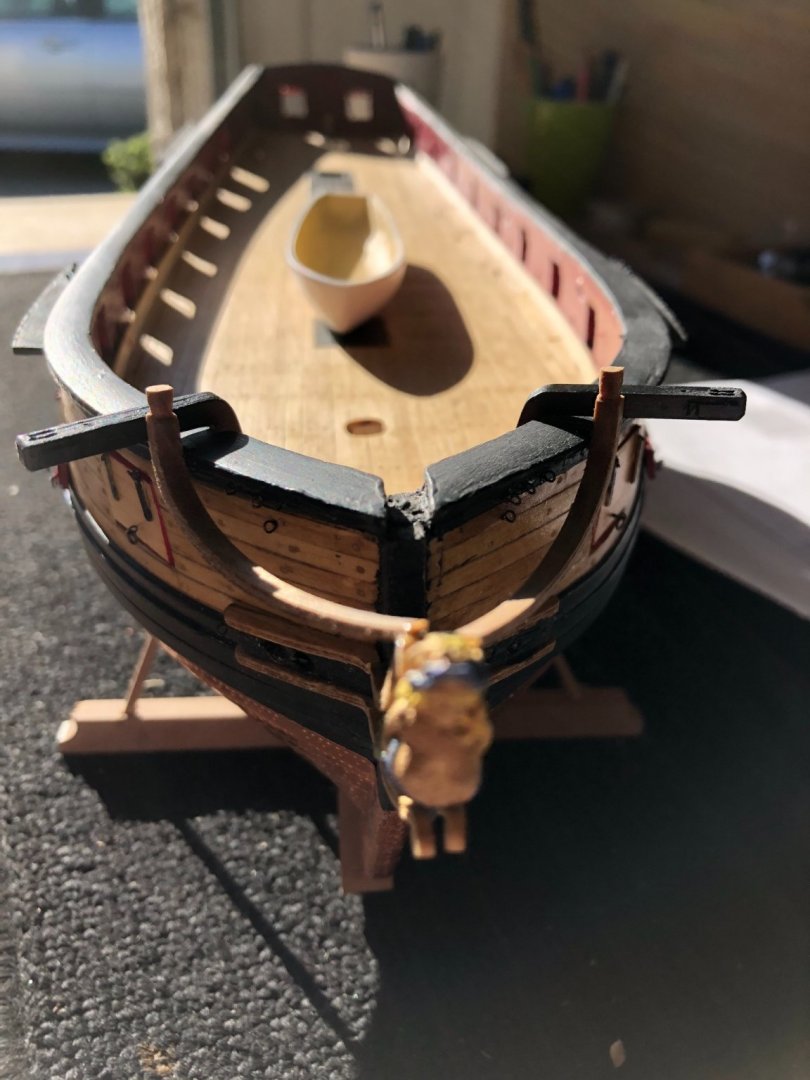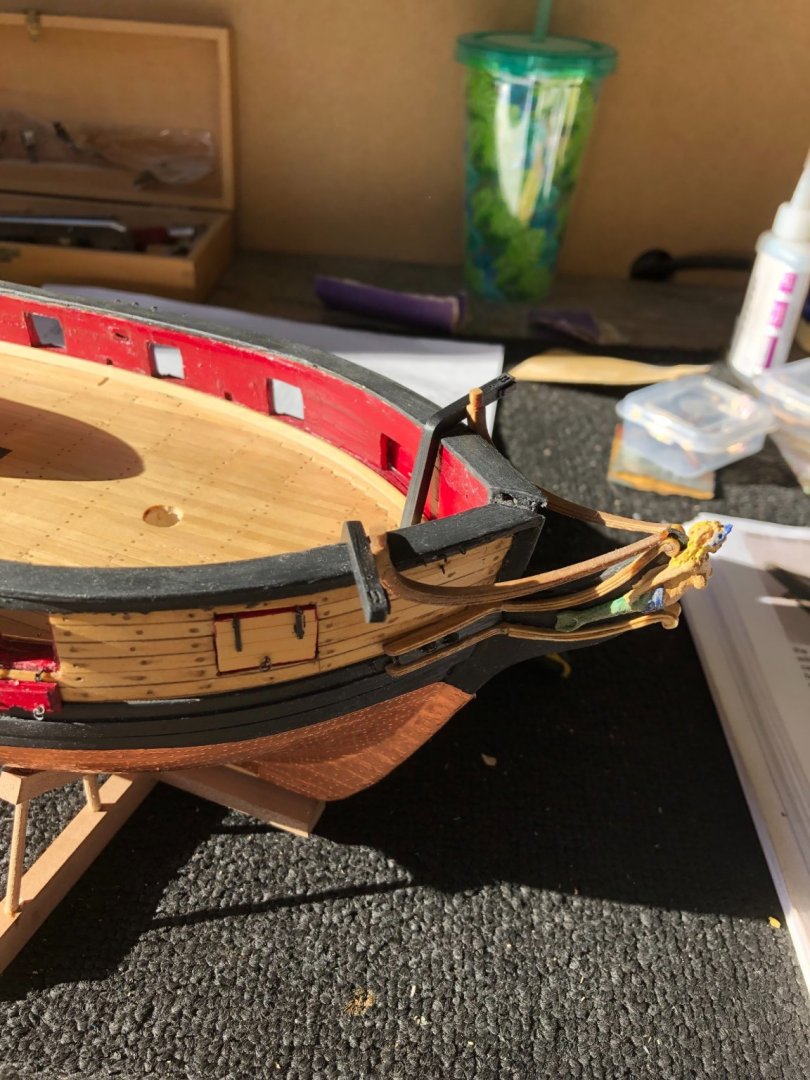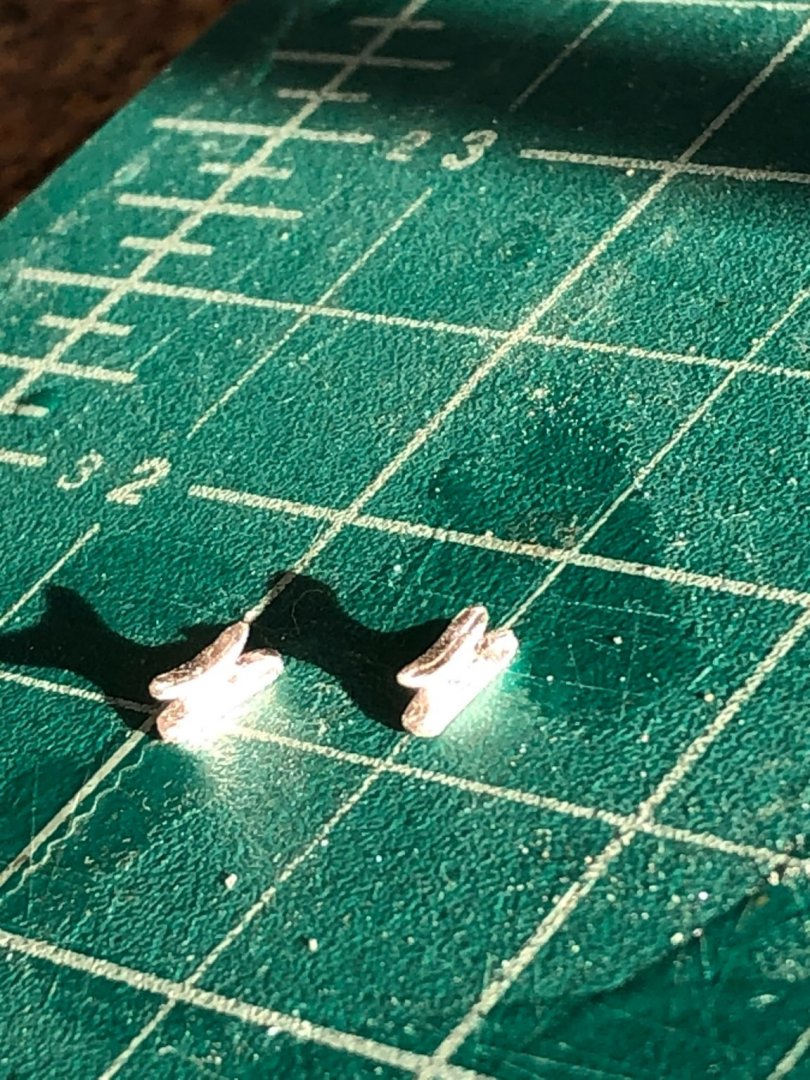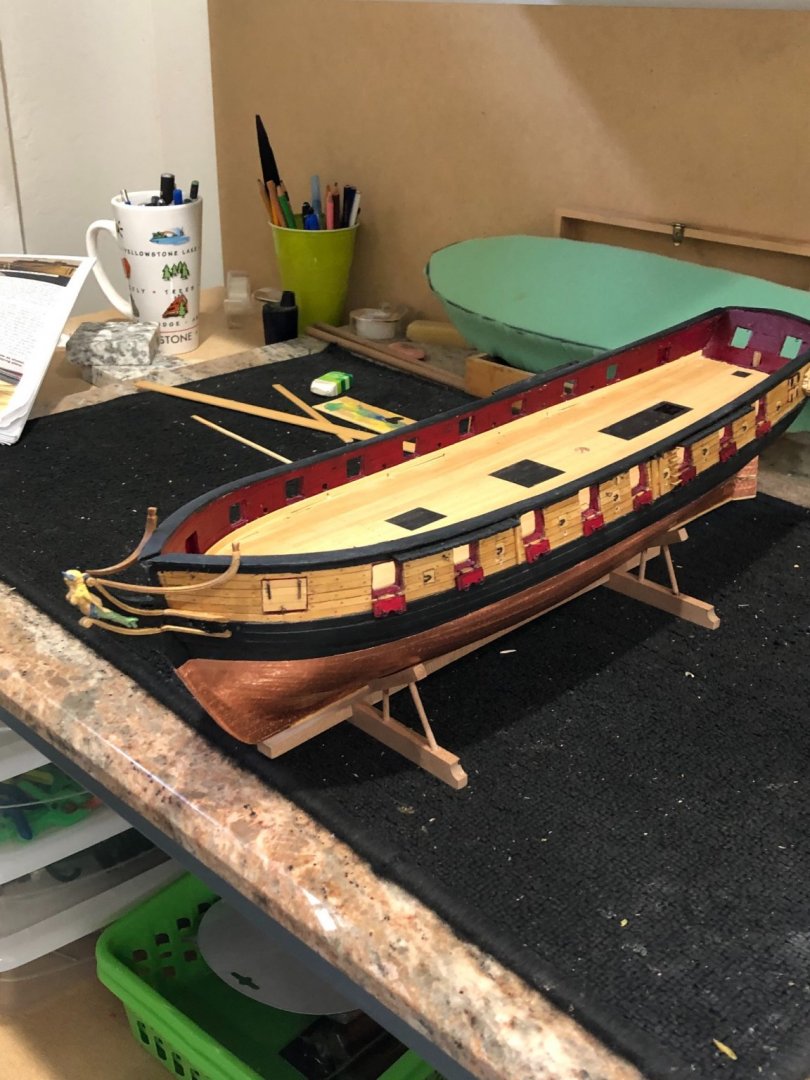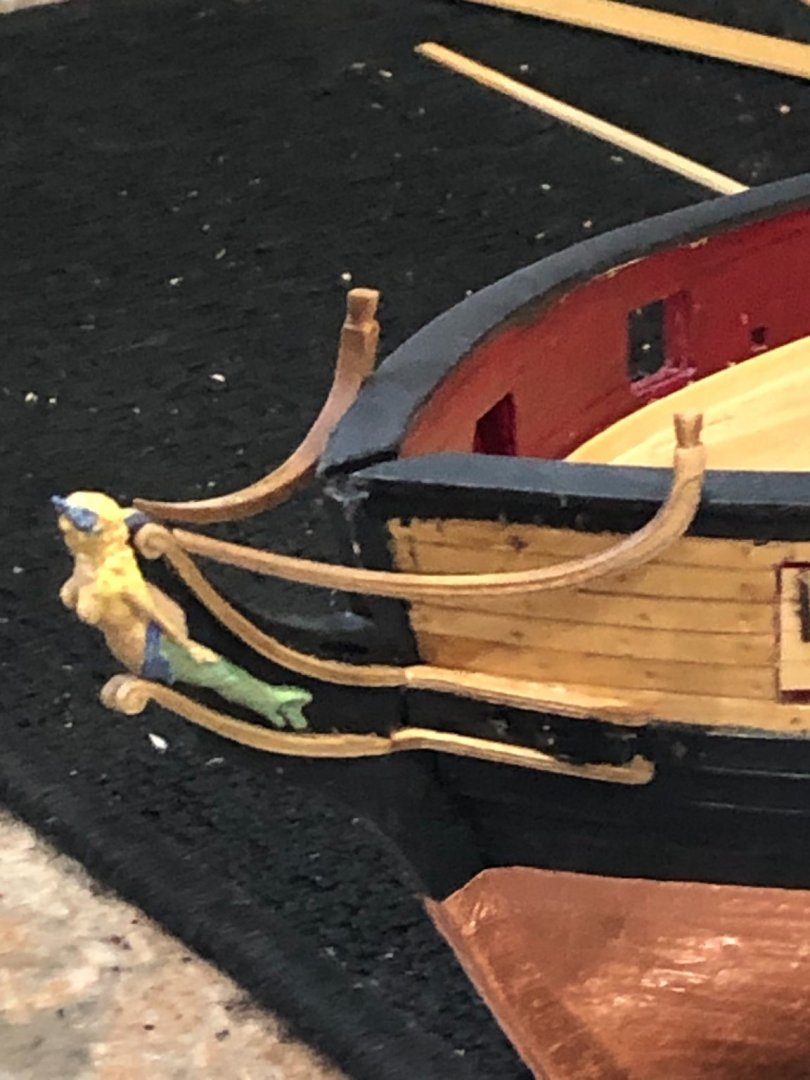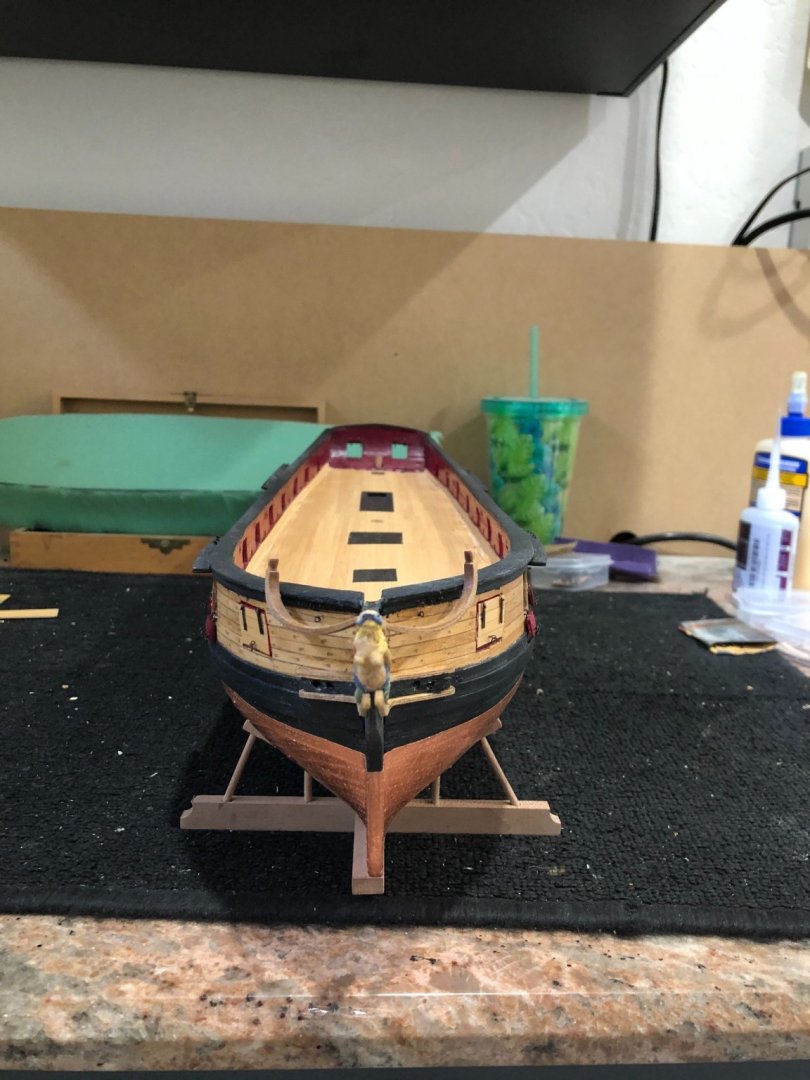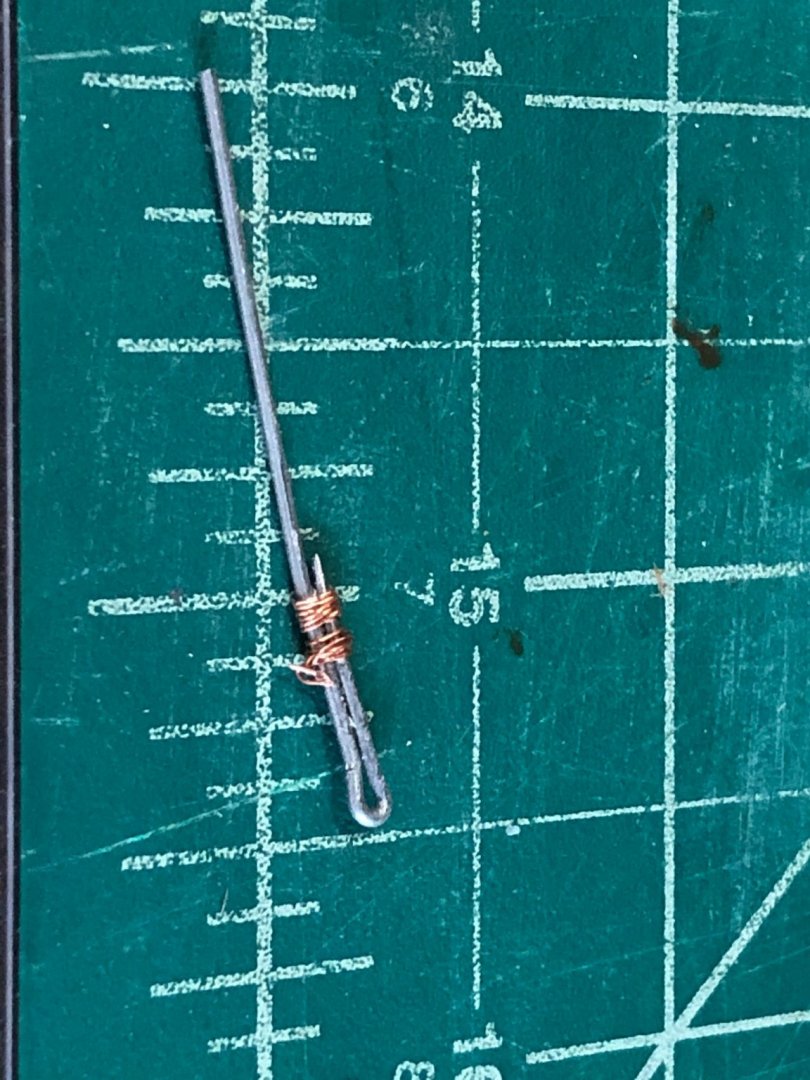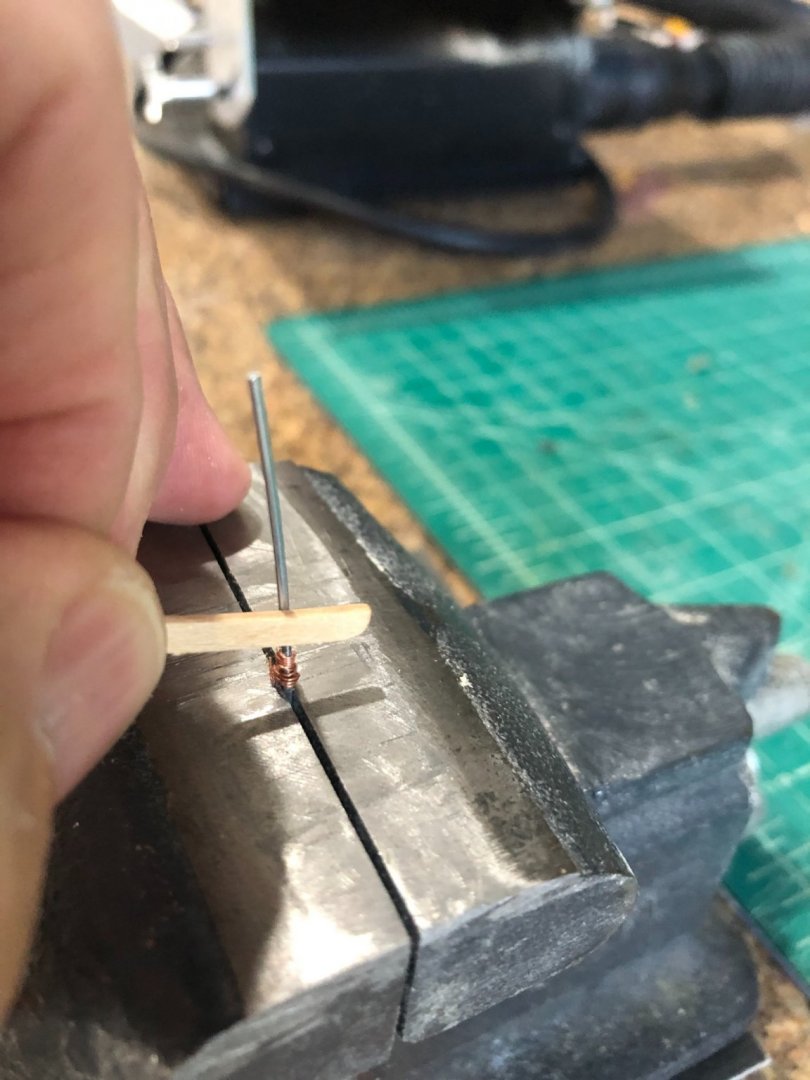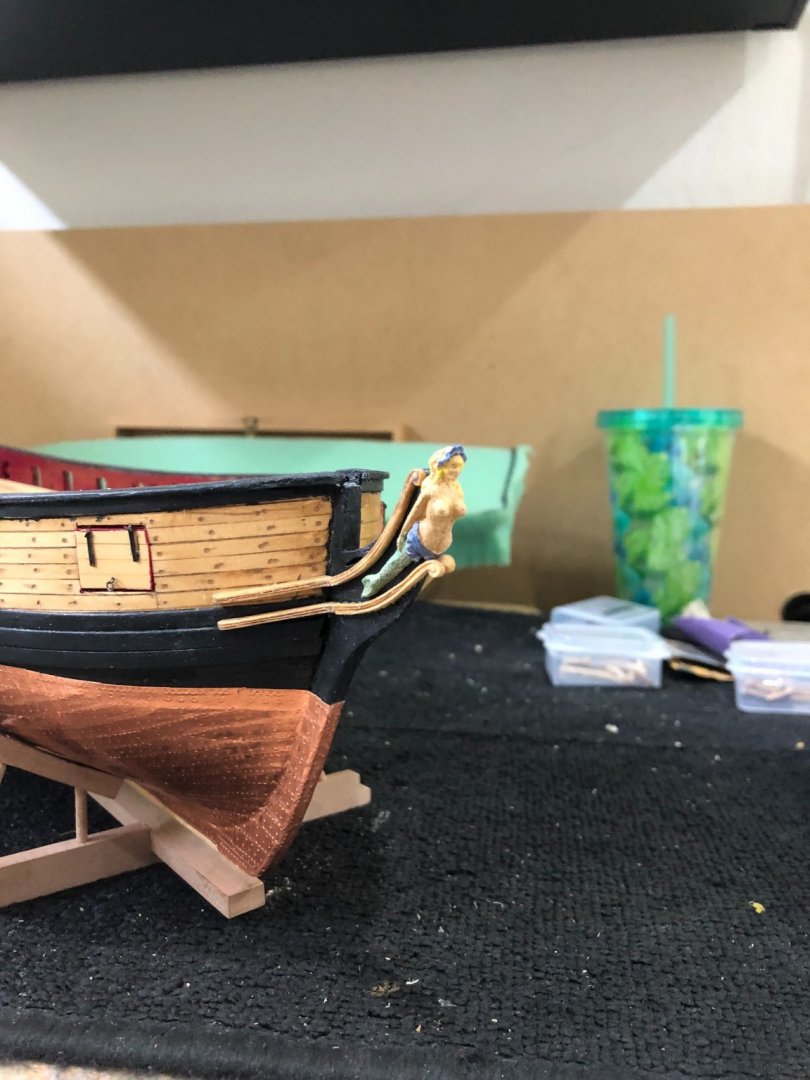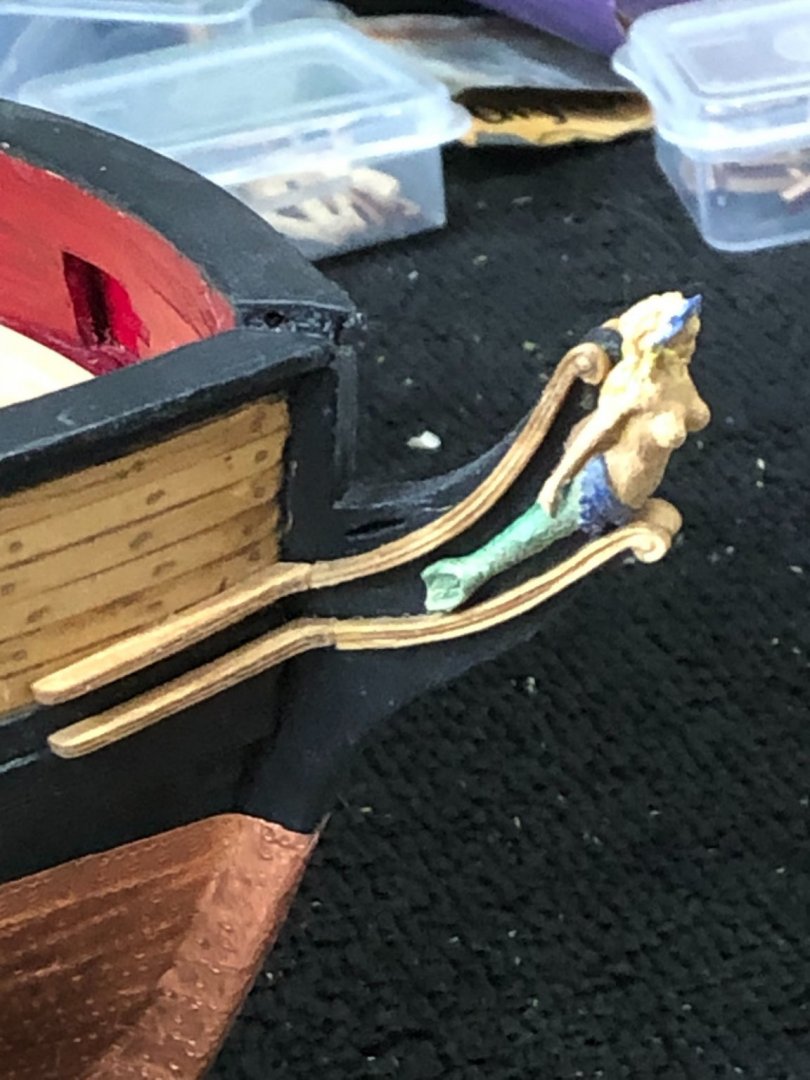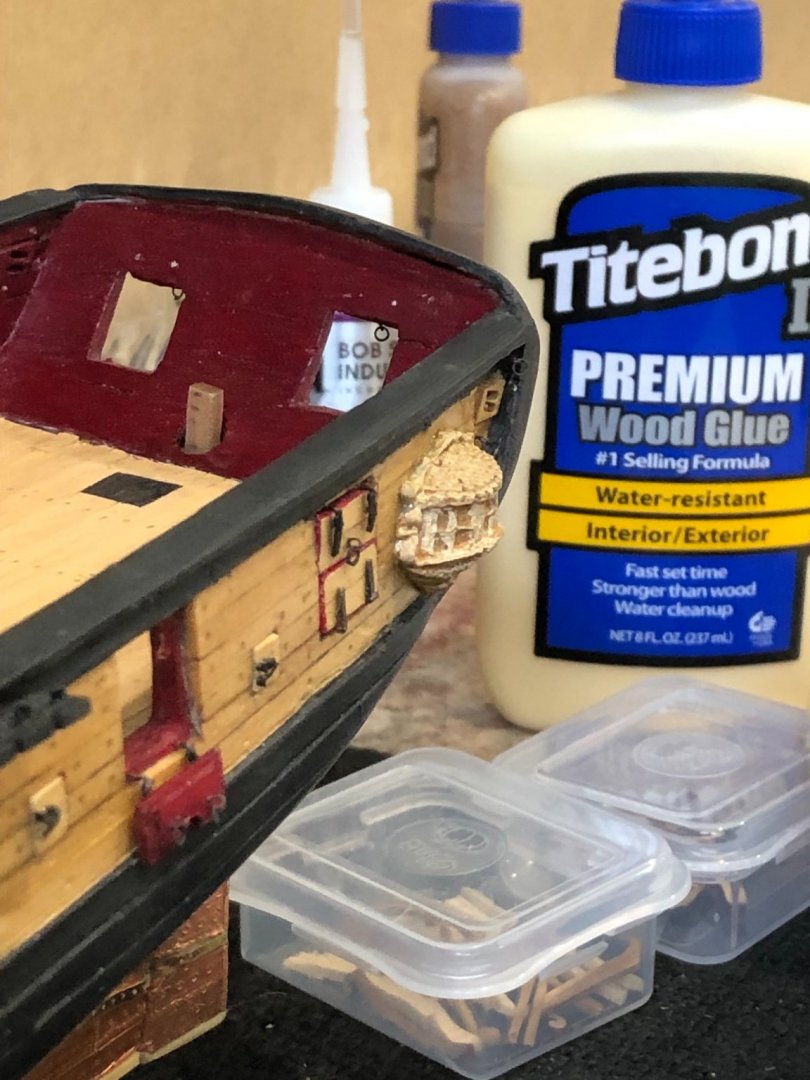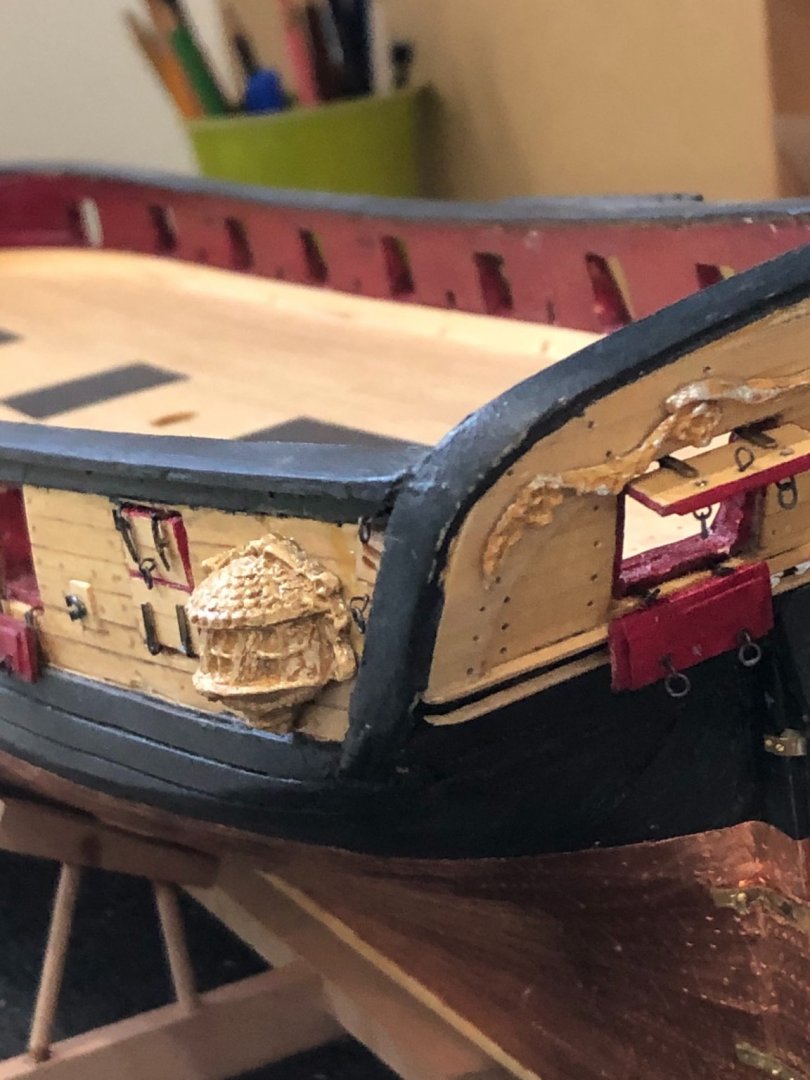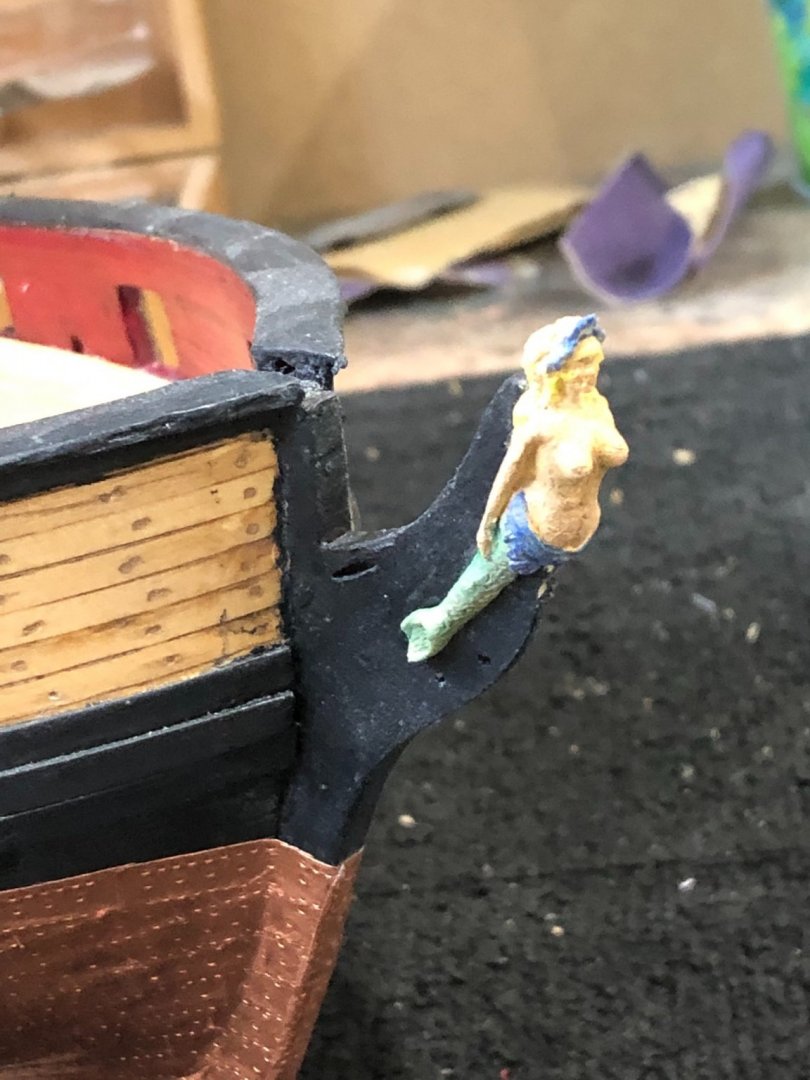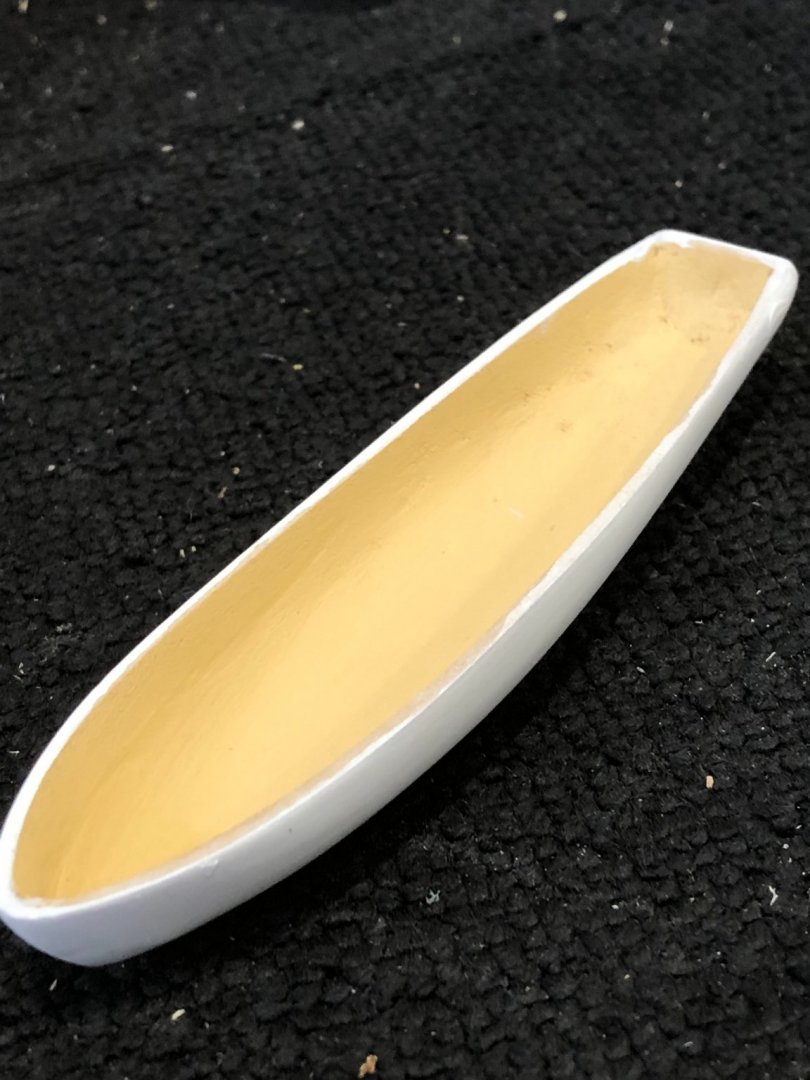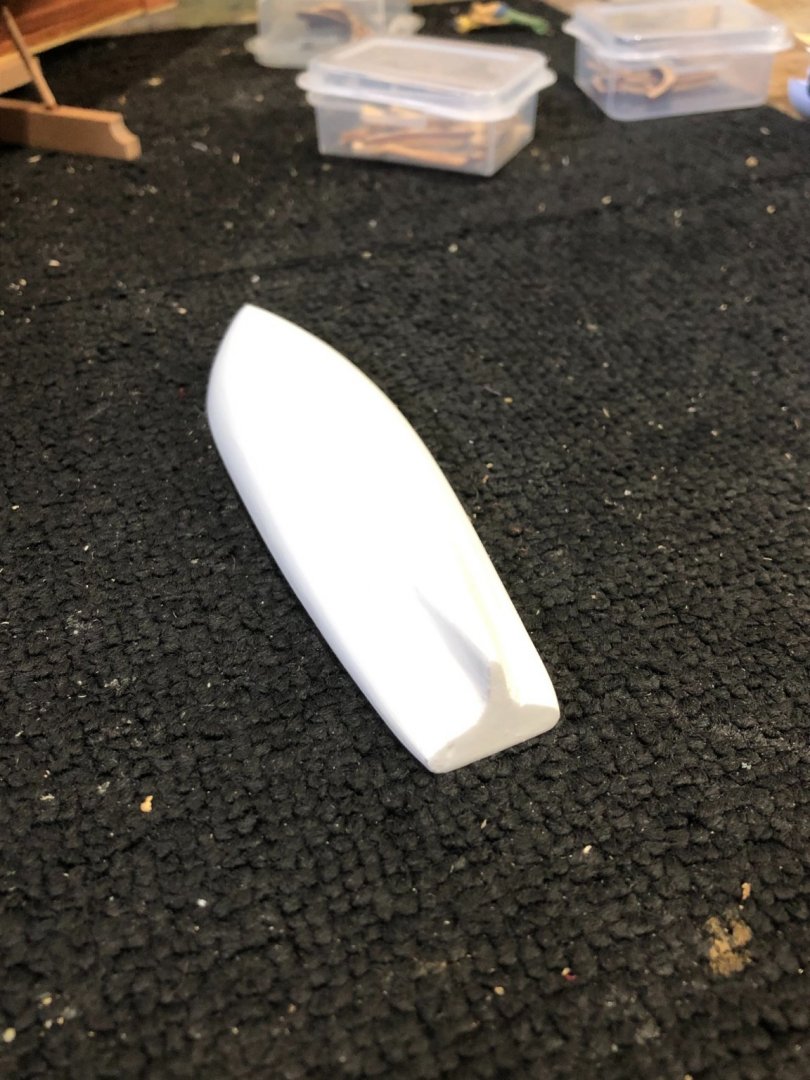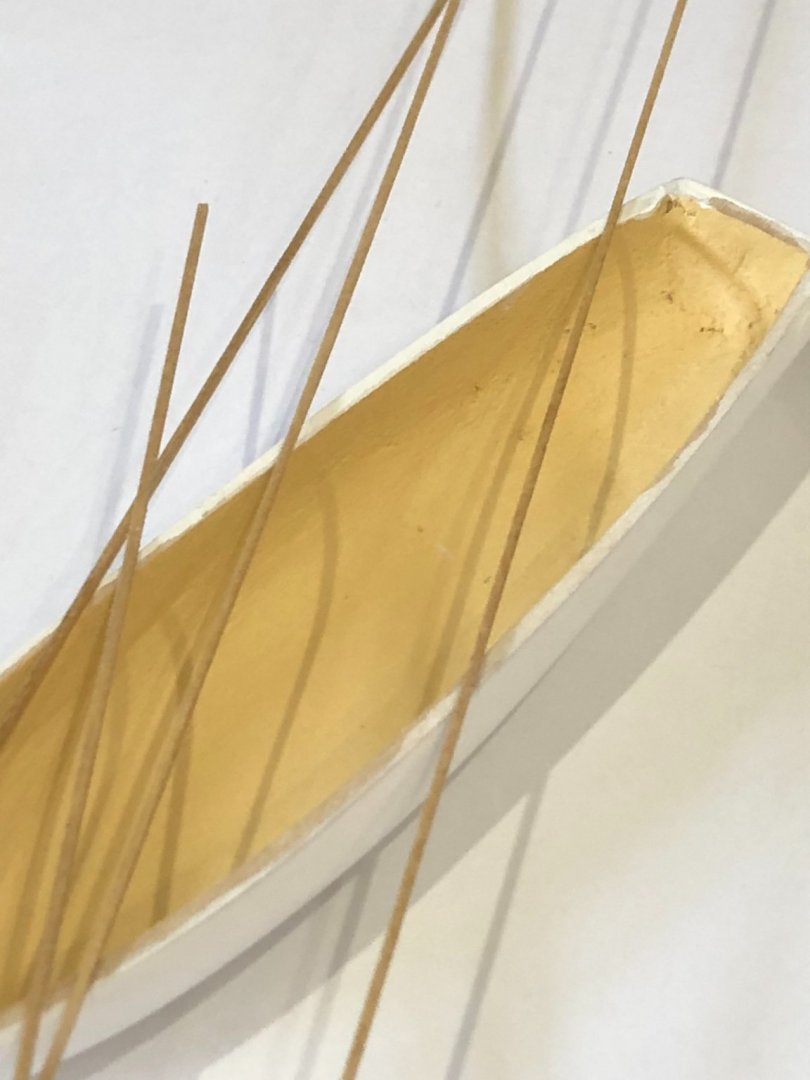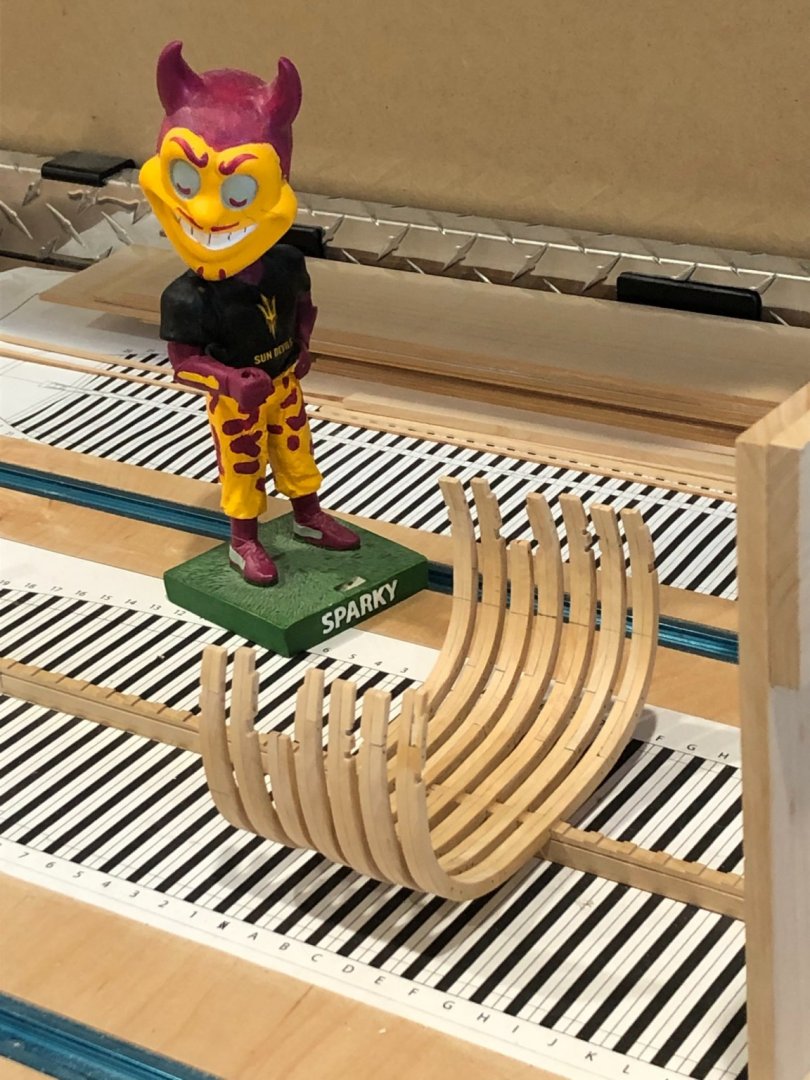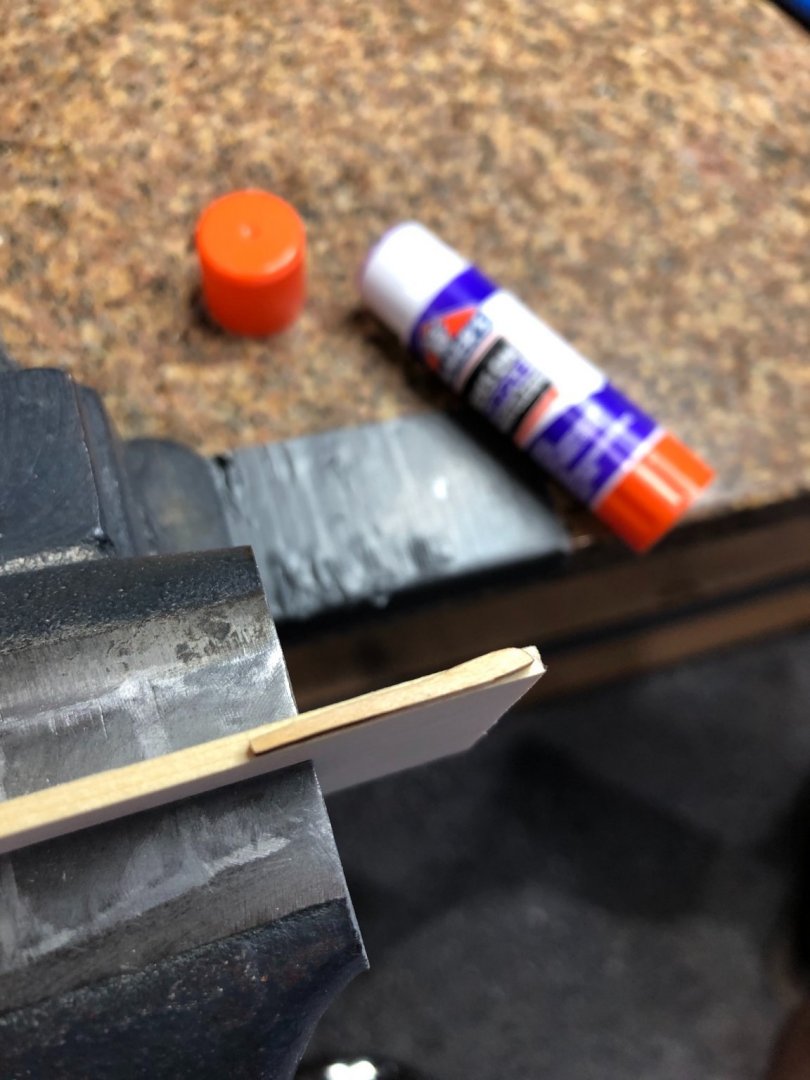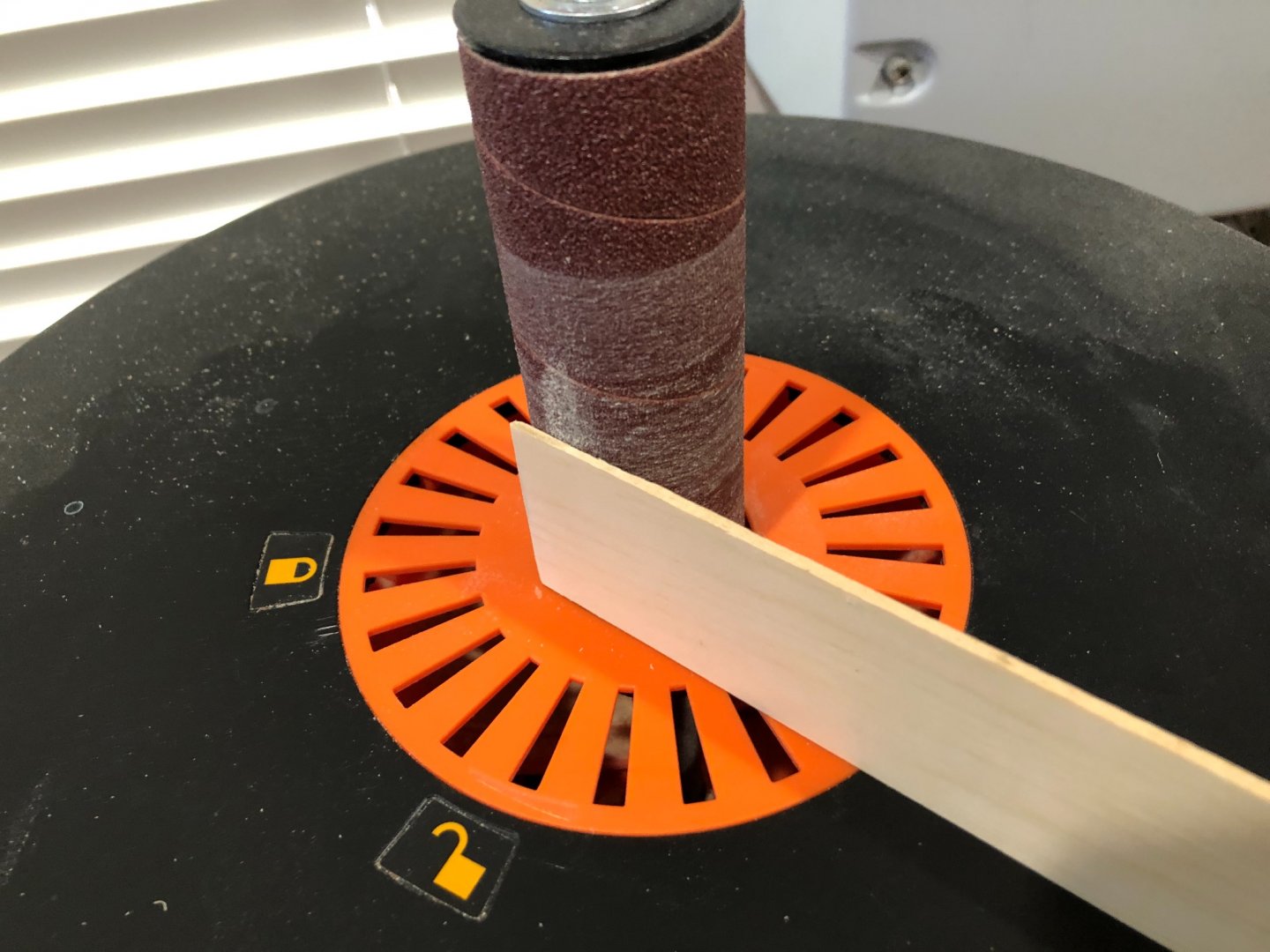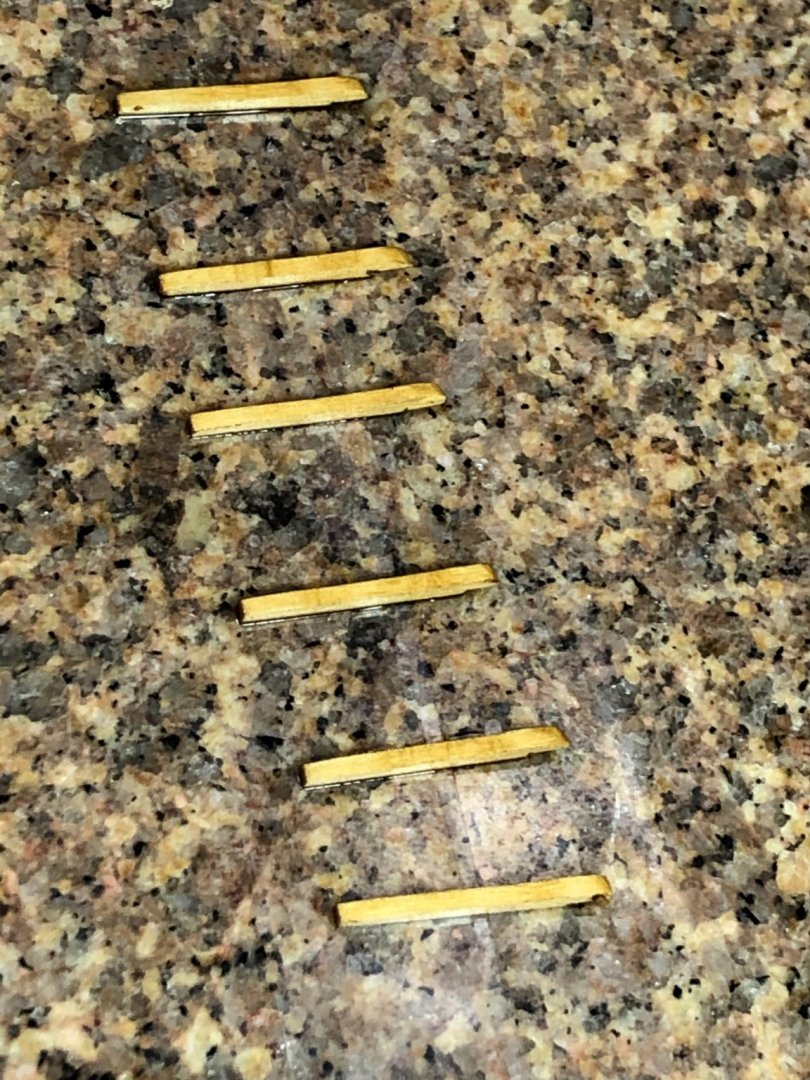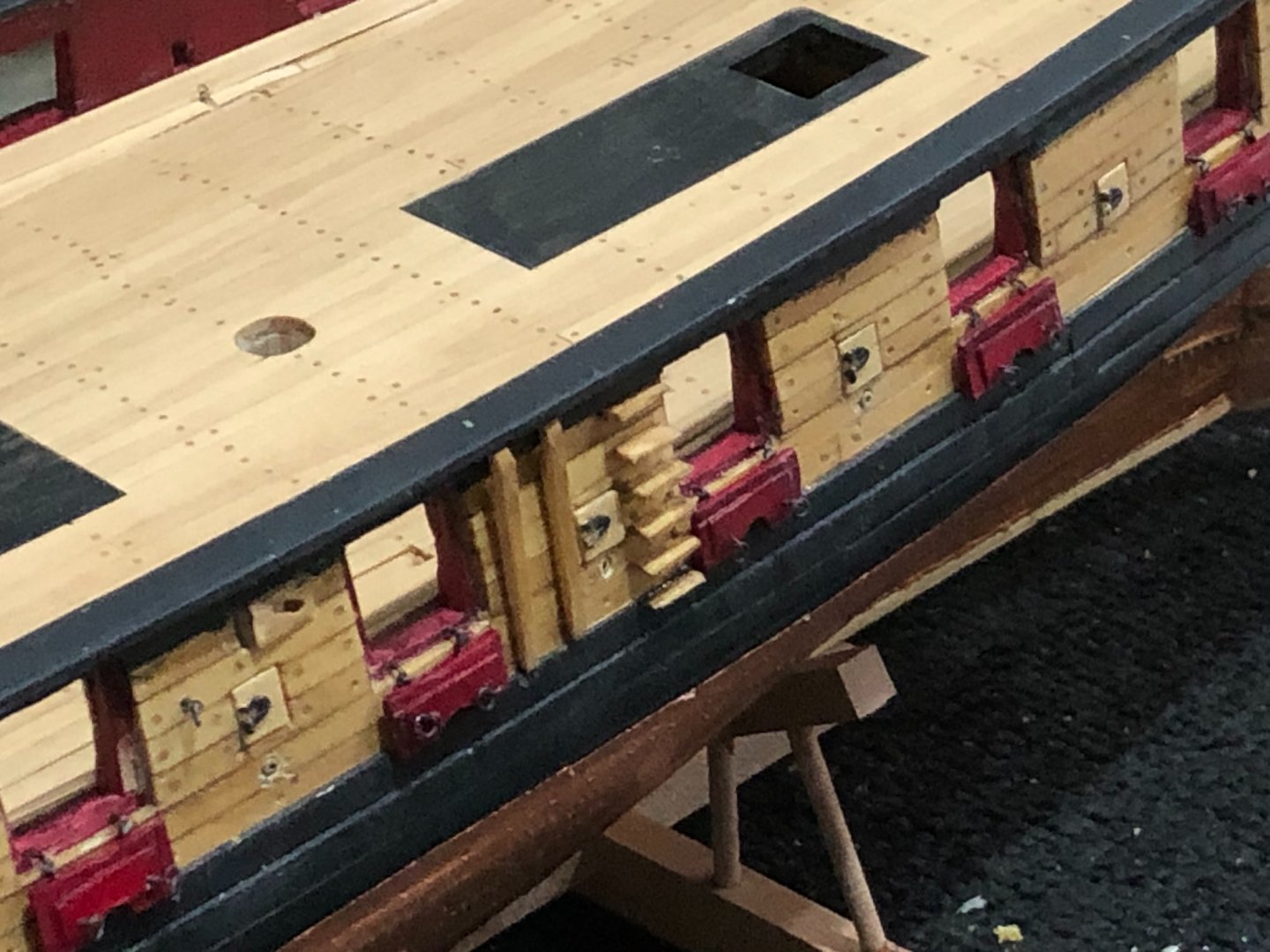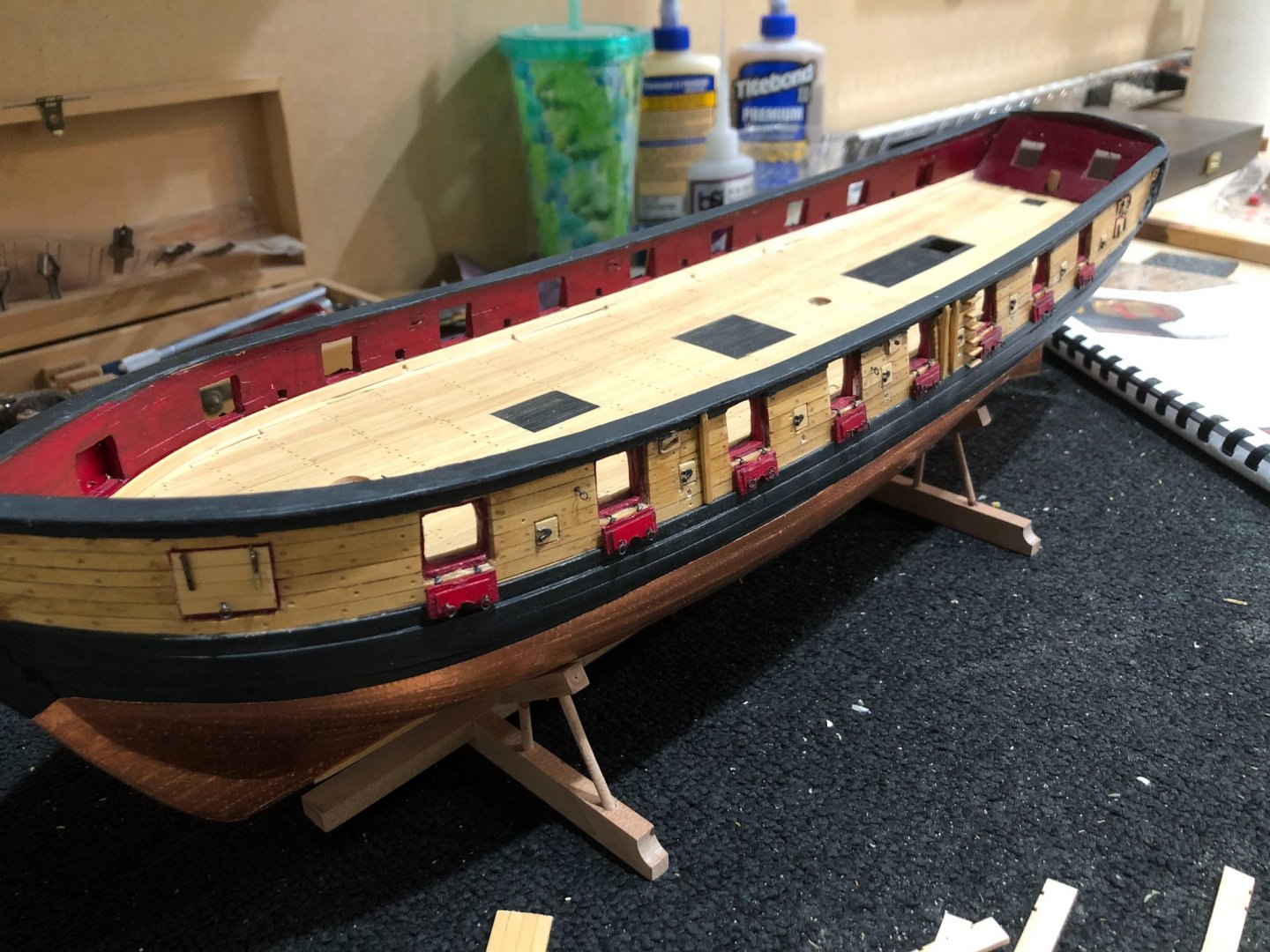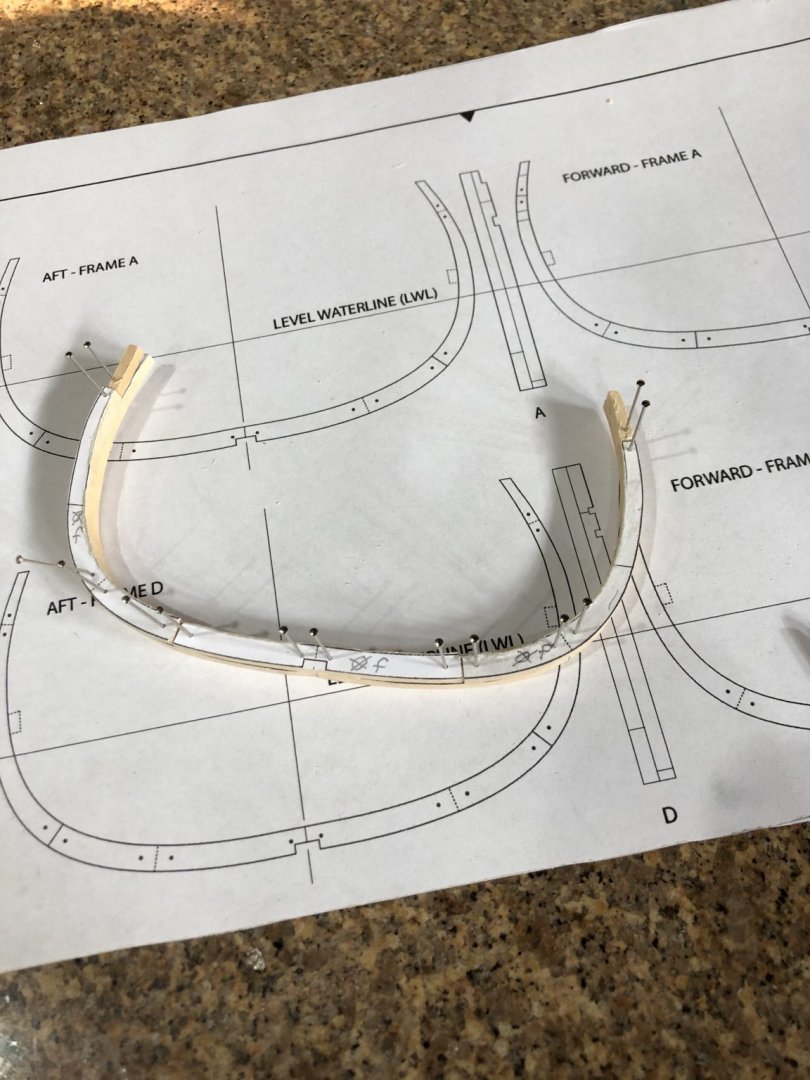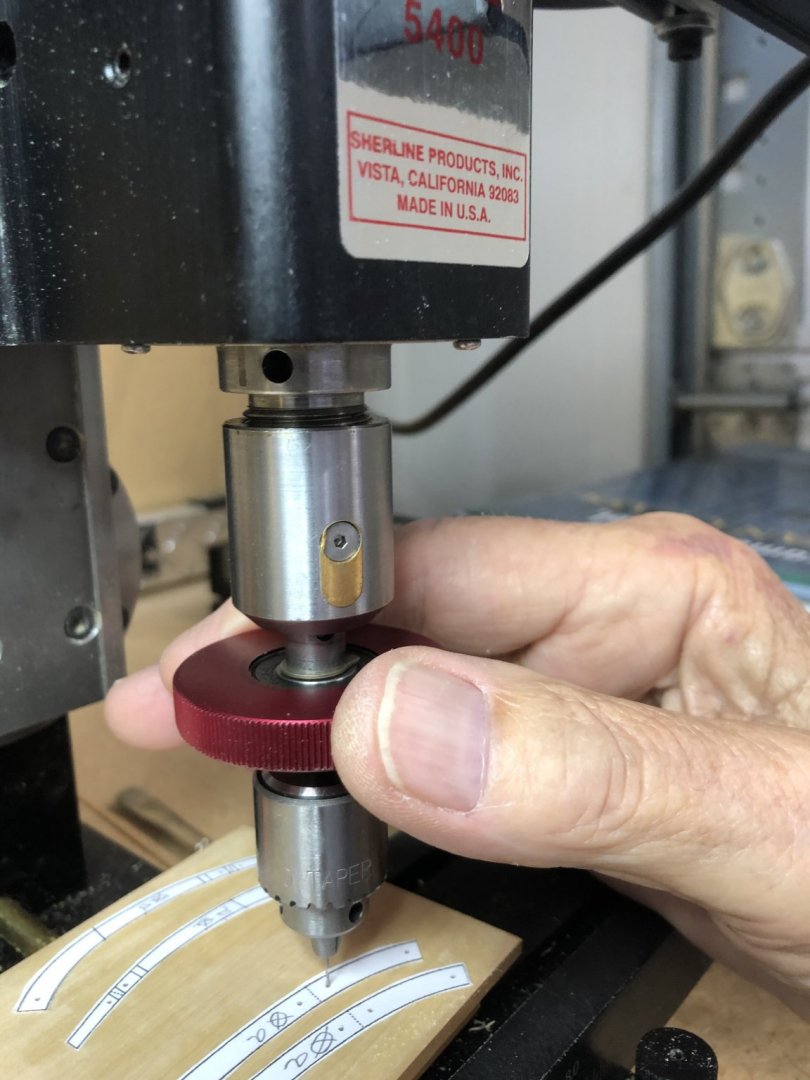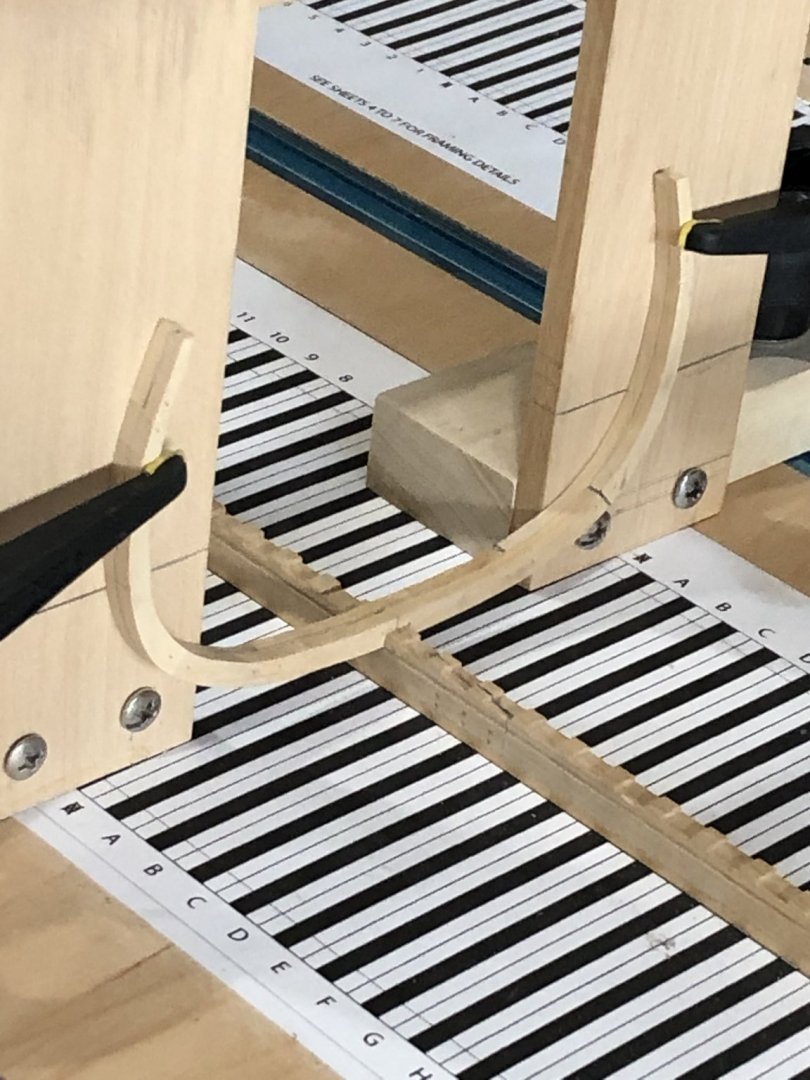-
Posts
556 -
Joined
-
Last visited
Content Type
Profiles
Forums
Gallery
Events
Everything posted by niwotwill
-
Cleaned up the pin rails and started preparing the cleats for the inside bulwarks. Worked on and off for 3 days on the white metal castings to remove the flash and smooth the finish. Almost all the 5mm cleats were like these in the photo. UGH!!! Closeup of a typical cleat After filing and sanding I chucked them into a machine vice and bored holes that I could then glue copper wire to support the cleats from rigging stress. 57 5mm cleats and 10 10mm after using "JAX" to darken them. Ready to start using them. I trim the wire to length as I fit them. Almost finished with the cleats and rings and then on to the carronades. Reading back through Syren logs, specifically about carronades, I noted that some had purchased their carronades from Caldercraft so I started to read up on 24 pound carronades. The kit carronades are way to thin in diameter for a 24 pounder so I bought the Caldercraft kits. Delivery was suprisedly fast from the UK Stay well and stay safe Will
-
Again, I can't say it enough, thanks for the likes and comments. 👍 Spent the day making pin rails. Started out cutting strips out of cedar 1/8" and 5/32" wide then milling them done to .05 thickness. The wider strip will be reduced to the 1/8" as it curves at the bow. I decided to drill the the holes in the to be curved pieces in a straight line as the curve is so slight on the short lengths. I used a 1mm drill for the holes, as suggested in the manual, on the mill to keep the spacing even and straight. My freehand drilling is suspect a best. I can't believe how you are able to make such perfect patterns by had. After drill the hole patterns I cut the strips to the correct individual lengths. Using the drill bits as registration the pieces were stacked with the drill bit keeping them aligned. The disk sander made sure the lengths were equal and the end angles were equal. I've had problems with pin rails coming loose on other builds so I'm going to pin these rails as suggested. Trying to align blind pins sounds like a difficult process so I decided to use #9 silk sewing pins through the rail into the bulwark. Drill .029 dia holes through the rails between the belaying pin holes. Painted the rails red to match the bulwarks. Pushed the sewing pins into their holes ready to set rail on bulwark. Put glue on the pin rail and set it against the bulwark. Push the pins in about 3/32" with pliers and when set snip off the pin protruding even with the pin rail. Touch up red paint and can't see the pins. Tomorrow I'll clean up the pin rails by lightly sanding and then another top coat of paint. Boy the zoomed photo shows everything but it does look much better to the naked eye. Thats it for today Stay well and stay safe Will
-
Thanks Patrick and Wally (hope you don't mind) I used a Proxxon lathe and swiss files and 600 grit wet-n-dry sandpaper to do minor cleanup. I must confess I got the idea and help from Thomas Gahm. I saw them on his log and asked how he did such a nice job and he was kind enough to post the method on his Syren log. One thing he pointed out was he kept a drawing next to the work area to reference spacing and such. On his log is a photo of his lathe with a piece in progress so I keep it next to my work space. After a few it becomes much easier and faster. You could use almost anything a drill or dremel as long as they were secure to the work surface. Using the lathe has the advantage of the tool rest post but anything will do. Thanks again for the nice comments and likes. Stay well and stay safe Will
-
Back from holiday. Had a great time in San Diego. HMS Surprise Replica used in the movie "Master and Commander" Star of India a iron hulled clipper ship made in 1863 and rerigged as a barque OK travel show over I digressed. finished starboard sled brackets and then onto pintails. More on pintails tomorrow but spent time on belaying pins. Using Thomas's method with toothpicks. I bought some birch wood toothpicks which turn nicely and hold stain well. I've made 25 today and 75 to go (oh yeh having some fun now} I'll probably make 20 to 25 extras for spares. Darker ones are after a quick light stain. Well touch red pain tomorrow and more belaying pins. Stay well and stay safe Will
-
Still working on installing frames. Frame O just set tomorrow I'll set frame P leaving frames Q and R to go. This is my first scratch build and truly a learning experience so I'm following the book from NRG. The order of frames is the forward full frames and then the rear frames followed by the rear half frames and the transom and stern. Next is setting the forward half frames and cant frames. I'm making the drawings for the aft frames having completed 1 through 4 and I've built 1 & 2 where I start setting aft frames as I go along. That's a quick update more to come soon Frame "O" being set Stay well and Stay safe Will
-
Patrick the interior bulkheads around the gunport and sweep port is very amazing, great work. It looks as if there is sufficient distance between the deck and sill for the margin plank and waterway, so as not to have the same problem I had on mine. Very nice Will still on holiday Stay well and stay safe
-
Amazing progress and looking very nice especially the bits and pieces you've scratched built. Awhile back you were worried that school would slow your progress, but it appears that has not been the case. How is school doing? Stay well and stay safe from Will on holiday.
- 949 replies
-
- syren
- model shipways
-
(and 1 more)
Tagged with:
-
Thanks all for the kind words and likes it means a lot to me and keeps me motivated. Finished the port side sled brackets. Turns out its not as simple as I had thought it seemed that the margin plank and waterway rose too high not leaving enough room under the port sills. I had to carefully trim each port about 1/64th" to 1/32nd" for the top of the sled bracket to be level with the port sill instead of standing proud. I'm hoping that the carronades, sleds, and associated rigging will obscure the trimming. Were going on a little holiday trip to San Diego to see and feel the ocean (I love the desert but I grew up on the ocean) celebrating my wife birthday. When I get back I'll touchup the red paint where I cut away the waterway. Spent time on the longboat getting the thwarts set in place next on the windlass and few bit on the thwarts then I'll put it away and concentrate on the Syren. More when we return next week in the mean time Stay well and stay safe. Will
-
Your progress amazes me and the quality of the results is amazing. Will
- 949 replies
-
- syren
- model shipways
-
(and 1 more)
Tagged with:
-
Finished chapter 10 and started chapter 11 today. I used a toothpicks to make the bumpkins working very well and took the golden oak stain perfectly. For the bumpkin support irons I used a piece of connecting brass from the photo etched pieces using the toothpick as a mandrel I bent them to shape and glued them on the upper rail. Chapter 11 started with removing the sled brackets and getting them ready to paint. I painted the brackets and will start assembling them tomorrow. In spare or rest time I work on the longboat getting the grates made and the rear thwart made ready to add the balance of thwarts. I also started making belaying pins out of toothpicks using Thomas Gahms method using a Proxxon lathe too turn them with files and sanding sticks. Need 100 of the buggers but 10 or so a day and we will be ready. Longboat as of today Thats it for progress Stay well and Stay safe Will
-
Tiller looks fantastic. I'm still admiring the wheel though as Thomas said star of the deck so far. It might be pushed from stardom when you rig the steering lines to the tiller. Will
- 949 replies
-
- syren
- model shipways
-
(and 1 more)
Tagged with:
-
Thomas I'm with everyone on you work. Reading Patricks comment I decided to go the loo before reading your log. Awesome. Back too belaying pins and the lathe. Looking at the photos leaves me wondering how you repeated the pattern. Do you use a pattern follower or some other method? I'd love to make my pins but just don't know how I'd repeat the pattern for the necessary uniformity. Stay well and Stay safe Will
-
Been awhile since I checked up on your progress, boy a lot has happened. Its looking really good. I like you method of making the breech lines droop as they would been so heavy. Great Job Just a note about laser cut parts. The kit parts were cut from one side so the result is the hot side will be burnt more than the cool side meaning the line sides are angled. Your Passaro parts don't exhibit this because Chuck tunes the laser better and cuts from both sides is what I've been told. Stay well and stay safe Will
- 949 replies
-
- syren
- model shipways
-
(and 1 more)
Tagged with:
-
Patrick you are a poet for sure. She's looking really nice I like the bare wood look to see the construction time and patience you put into your building. Im retired so keep in mind that during these times of pandemic you still have chums to talk to at work. I go into the shipyard and only come out to have lunch with the wife. So being slow is a benefit when I see the wonderful work you're doing. Will
-
Quick update I got the uprights on the are between the cheeks and middle rail and middle rail and top rail on the port side. Long day of fiddle work. In-between drying time I put the walnut floorboards on the longboat. Next is the gratings and twart support. It feels good to see fast progress when working on the small size of the longboat. The unfinished dark walnut gives an aged weathered look to the floorboards More soon Stay Well and Stay Safe Will
-
Been awhile since last post but I've been busily working on the middle rails and have finally put them on the ship. I'm not really happy with how they've come out, but for now I'm leaving them on the model. I first tried to you the laser cut basswood but had the same results as before when trying to carve the details. The basswood is very soft and picky that if I pushed just a little to hard the wood fuzzed up and didn't look like a clean cut especially after staining. Next I made a set from the yellow cedar using the cutout image left from the laser. These came out better but were to small/thin after tracing the cutout and cutting the part from the wood sheet. The last set are made from cedar but without a pattern I just carved them using the plans as a guide. The shape is good but still not sure about the curves but we will see as I keep looking at them. This is the last version I had a lot of time to work on other things while trying to make the middle rail so I went back the longboat that I had made the hull shape. I ripped some 1/32 by 1/32 strips from cedar, stained them a dark oak to give contrast from the tan paint inside the longboat. Putting those frames inside was a long slow process. soak one, fit one, glue one, wait till dry, cut top off, soak one, fit one etc. Finished the frames and started the floor boards. Awhile back I met an old scratch modeler who was selling his equipment. I bought his Sherline long bed lathe and accessories while loading the lathe in the car he said I left a crate of wood at a common friends house has he told you about it. One day visiting our common friend the friend said he had the crate of wood left by Peter, did I want it. The wood was in a large wooden crate and it was beautifully full of all kinds of hard wood. (pau margin, swiss pear, walnut, mahogany, holly, ebony carbon, cherry and beech to name a few} So having this I decided I'd use the walnut for the floor boards since unfinished they will look like weathered wood. Now I just need to figure where I can use this gift. Thats it for now onto the uprights and top rail. Stay Well and Stay Safe Will
-
Catheads made and fitted to bulwarks with the appropriate reliefs in the top rail and sheer now just need to add eye bolts, cleat and finish painting. Making the the cathead stopper cable sheave was challenging milling a piece of wood to 1/64" and then cutting, glueing and sanding. The actual sheave was made using a circle template and a very sharp 6H lead repeatedly drawing a 1/16" circle until it came free. Not sure of the value of this since you can't see it once it mounted. Spent about an hour cleaning up the cleat castings of flash and shape. Now there ready to drill a small hole in the bottom for a 22awg copper wire to fit into a corresponding hole in the cathead. I have too many cleats etc come off during rigging so the pinning is what I do to prevent this. Tomorrow I'll drill the holes and mount the cleat. Looking at the picture I have more work to do on the right cleat. The camera shows everything. All done for today Stay Well and Safe Will
-
Thanks Patrick for the nice comments and thanks to everyone for the likes. Started the top rails by sanding off all the laser char (that was very deep) and smoothing all the surfaces. I found the best way to smooth the basswood was to use very fine sandpaper with a very light touch. Actually I used 600 grit wet-n-dry but only without water and it almost made a surface nicely prepared to carve the lines. Shaping the timberheads was a problem with the soft wood and I broke one off, thank goodness the kit gives you extras. That all done it was time to stain them. I used the prestain conditioner and then stained them with golden oak. Measuring the mounting position was somewhat problematic as I couldn't hold them and measure at the same time then I remembered the glue I use to glue the Washington frame patterns unto the wood to cut. I use elmers glue sticks as kids use in school. Elmers worked great and allowed me to measure and visually make sure that both side were symmetrical and the beauty is it is water soluble. I carved the line using the same tool used with the cheeks and whiskers. Next on the catheads and middle rail. Yippee Stay well and be safe Will
-
Started the dreaded chapter ten and it started as I feared, difficult. Snapped out the cheeks and whiskers and tried the carving method described in the instructions without any success. I made new cheeks, out of cedar, using the panel as a template. Tried Chucks carving method again with better results, not sure if its the cedar or I was getting better, but I still didn't like the look. I remembered from a log how they'd made a wire tool to carve small parts. I made a tool out of .031 diameter steel wire. The end of the wire was rounded and polished to the shape of a dull pencil point. I bent the wire in a "U" shape with on side longer to use as a guide. To keep the form while using the tool was wrapped with a thin copper wire keeping both sided aligned. s Securing the tool in a bench vise and then dragging the part across the point repeatedly with light pressure made very nice lines in the cheeks and whiskers. Reversing the process made a line parallel to the first giving a nice finish. The cedar was nice as it didn't fuzz up as the basswood did with the same tool. Parts made and stained were assembled without any drama. Now the hawse holes and the .031 plates. Next the top rail but before I do that I decided to put the ring bolts in place. Stay well and be safe Will
-
Before starting the cheeks I decided I'd finish the stern galleries. I'm still trying to make my own as others have done, but my skill on carving needs more improvement so I decided to use the cast metal ones until I'm happy with a set of mine. Spent quite a bit of time mixing paint to get a color that closely matches the stained bulwark planking. I got a color that matched but it still didn't look the way I wanted so I started trying to add washes and finally found that a wash of dark oak stain gave me the look and feel I wanted. Still delaying the dreaded chapter 10 so I started the longboat. Now that the outside and inside are finished I can start assembling. I milled down a piece of Alaskan Yellow Cedar down to 1/32" thick and then ripped 1/32" strips. Stained the strips dark oak stain so they'd have contrast when against the tan of the inside. That being done I wanted to dress up the mermaid so I cleaned up the casting flash and etc. I painted her flesh body, green fin, blue waist and tiara with yellow hair. It was very garish so I had to do something, ah back to washes. Finally settled on a tan paint & oak stain mixture. I like the result. Let me know what you think. I can't put it off any longer so onto the cheeks. Kinda cheeky eh! Stay and be safe Will
-
Thanks Mike for the words of encouragement. This is my first scratch and I'm learning how to use my new tools especially the scroll saw, but you are right it's getting faster and not so much going into the scrape bin. Just a brief update more to let all know I am still here working on frames in my spare time. Today I stepped "G" and cut and getting ready to assemble "H", "I" and "J" so tomorrow I'll be ready to step "H" since I can do one a day waiting for glue to dry. A picture of the current status I just realized this is the status up to "F". I don't know if I mentioned that I'm using 22 AWG bare copper wire and then blacken them with liver of sulfur which does not stain the wood. You can see the joints with the colored glue showing nicely to simulate the "goo" they used to seal the open ends of the frame pieces. I'm using Ed Tosti's method of using raw umber pigment powder mixed into Titebond II. More in a coupe of days Stay Well and Safe Will
-
Well chapter 9 is finished gun port and sweep port lids made and mounted. I tried to use the basswood fenders and chesstree but the stain didn't come out well and was way off in color/texture against the cedar stained bulwark planking so I made new ones of cedar. Making the parts was a straight forward process where I milled a piece of cedar to the fenders width and then glued a basswood fender to the edge of the cedar to use as a pattern and sanded the cedar to shape then using a slitting blade sliced off the new parts. Using the glue stick works great enough adhesion but water soluble to remove Using the drum sander to get uniform shape the width of the cedar Stain the parts on double sided tape with the edge to be glued against the tape The channels were straight forward to make and mount I did drill a hole into the channel and a corresponding one in the bulkhead with a 22 AWG copper wire to make them very sturdy. The Syren after chapter 9 Now on to the dreaded chapter 10 (Head rails and Cheeks) not looking forward to this chapter. Thats it for now Stay well and safe Will
-
I finally took some time out from other models to work on the Washington. Patterns for frames 0, A, B, C, D, E, F have been cut and frame 0 was glued to a piece of timber. Cut all the pieces and fit them together with just the junction points finish sanded. Using a modified Ed Tosti pinning method to assemble the frames. First take the glued patterns and drill a hole in each spot where the pattern had a dot. I drilled a .026 hole the created a snug fit to a #9 silk sewing straight pin. Then dry fitting the parts with the pins as alignment registration. When all fit you take the parts apart and glue them with the previously darkened Titebond glue. The darkened glue makes a very nice line at the joints simulating the tar substance used in 1776. (To darken the glue I use raw umber artist pigment power mixed into the glue. Empty an 8 fl oz bottle of titebond and mix in 2 teaspoons of pigment stirring until completely mixed and the color of chocolate milk. It'll darken as it drys) All the done and the first frame has been raised. Yippee. Now on the the next six. Drilling alignment holes will have copper wire placed after assembled Dry fitting parts after drilling and scroll saw First frame raised yipee Now back to the scroll saw for more sawdust and parts to assemble. I hope making frames gets quicker as I progress. I'll get back to the Syren for awhile and then make more frames when I get tired of the Syren. Stay Well and Safe Will
About us
Modelshipworld - Advancing Ship Modeling through Research
SSL Secured
Your security is important for us so this Website is SSL-Secured
NRG Mailing Address
Nautical Research Guild
237 South Lincoln Street
Westmont IL, 60559-1917
Model Ship World ® and the MSW logo are Registered Trademarks, and belong to the Nautical Research Guild (United States Patent and Trademark Office: No. 6,929,264 & No. 6,929,274, registered Dec. 20, 2022)
Helpful Links
About the NRG
If you enjoy building ship models that are historically accurate as well as beautiful, then The Nautical Research Guild (NRG) is just right for you.
The Guild is a non-profit educational organization whose mission is to “Advance Ship Modeling Through Research”. We provide support to our members in their efforts to raise the quality of their model ships.
The Nautical Research Guild has published our world-renowned quarterly magazine, The Nautical Research Journal, since 1955. The pages of the Journal are full of articles by accomplished ship modelers who show you how they create those exquisite details on their models, and by maritime historians who show you the correct details to build. The Journal is available in both print and digital editions. Go to the NRG web site (www.thenrg.org) to download a complimentary digital copy of the Journal. The NRG also publishes plan sets, books and compilations of back issues of the Journal and the former Ships in Scale and Model Ship Builder magazines.


